SHANNON LEVITT | STAFF WRITER
On the second day of a 10-day November trip to Israel, Pastor Terry E. Mackey of Pilgrim Rest Baptist Church in Phoenix, stepped into the Jordan River to baptize his flock.
Sixty Pilgrim Rest members and 22 from Scottsdale’s Congregation Beth Israel (CBI) toured the country Nov. 7-17 together. For most, it was a first visit and nobody, not even people who had been to Israel before, knew what to expect.
Jews stood on the shore and watched the baptism, transfixed by the powerful image of their new friends immersing themselves in the same waters as Jesus in the New Testament.
“Some of the Jews were moved to tears — it was incredibly emotional for everyone,” CBI Rabbi Stephen Kahn told Jewish News.
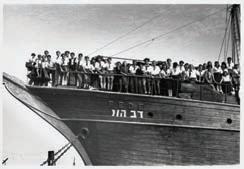
Kahn knew some remarkable things could transpire for both congregations during this unique voyage, which “was really what I wanted.” He just wasn’t sure how those things would manifest. The baptism became one of the most talked-about moments on a trip full of talked-about moments.
SEE TWO CONGREGATIONS, PAGE 2
SHANNON LEVITT | STAFF WRITER
Chai, before she even became a rabbi, there existed a hint of the path she would walk.
During her bat mitzvah at Temple B’nai Shalom in Fairfax, Virginia, the young Segal said, “Dear God, this is my time. This is my prayer. This is my moment.” She elaborated by pronouncing her moment as one connected to the Jewish future.
Temple Chai congregants learned this piece of her story from Segal’s own rabbi, Amy R. Perlin, who not only presided at the bat mitzvah but “saved every note, every email, every recommendation, every question” that Segal ever sent her.

“I can trace the making of your rabbi, her thoughts, her lifelong desire to make Jewish choices and the Jewish song in her heart,” Perlin told approximately 400 people in Temple Chai’s sanctuary, who had come to watch Segal be installed as the temple’s senior rabbi on Friday,
senior rabbi
Rabbi Amy R. Perlin, left, offers blessings to Rabbi Emily Segal, center, as Cantor Ross Wolman and Rabbi Bonnie Koppell stand next to her at her installation at Temple Chai on Friday, Jan. 6.

Jan. 6.
“This is your moment Rabbi Segal, and we are blessed to share it with you,” Perlin said.
SPECIAL SECTION | 15 HOME DESIGN Minimal Living Concepts is designing additional spaces for Arizona homeowners. SEE TEMPLE CHAI, PAGE 4

$1.50 NATIONAL INTERNATIONAL

Segal invited everyone to come in, find their seats and welcome the presence of Shabbat.
The song-filled service was infused with emotion from the moment
KEEP YOUR EYE ON jewishaz.com
COURTESY MARILYN ZOLONDEK ISRAEL This year’s ‘Jewish Nobel’ is a group prize, going to Jewish activists supporting Ukraine As Boston dedicates a massive monument to Martin Luther King, local Jews march in solidarity


one Jewish and one Baptist, went to Israel together. Here’s what they learned.
Ron Paler, who attends services with his husband, Michael Loya, somewhat regularly, said he was 23 How to find newly released Israeli immigration records from 1919 onward
ListenUp, a storytelling app created by a Jewish couple in Scottsdale, offers hyperlocal community stories. See page 18. COURTESY OF LISTENUP
ListenUp app launches
A crowded and enthusiastic Temple Chai installs its new
L
ong before Rabbi Emily Segal stepped foot in Phoenix’s Temple
“Powerful and emotional” was how Martin Schultz described it. The longtime CBI congregant theoretically understood what a baptism was but that idea “was nothing like this,” he said. He watched as even people with physical limitations, some using wheelchairs and canes, refused to be deterred and stepped into the river one at a time.
And when they came out, Kahn was standing on the shore with a towel, ready to assist the newly baptized.
When Schultz first heard about the trip, he immediately signed up for what would be his third visit to Israel. He hoped this time would be “an intense learning experience,” he said. “It worked out to be a whole lot more.”

Pilgrim Rest Elder Richard Yarbough said that having everyone present for the baptism gave the moment “a different feel, a different significance. We were blessed to have our friends from CBI witness it,” he said.
CBI Rabbi Sara Mason-Barkin explained that for the Jews in the group, who often experience their religion more with their brains, witnessing something so heartfelt and tangible left them asking themselves and their rabbis, “How can I experience Judaism more from the heart? What can we do Jewishly that is tantamount to this baptism experience?”
“Our members really saw what that faith system, their religion, their pastor, means to them and it was very extraordinary,” Kahn added.
Much more was to come.
The two congregations have come together a few times in the last three years, and the idea for the trip sprung unexpectedly from one such moment. At a joint Torah session over Martin Luther King
Jr. weekend in 2020, Kahn asked how many people from Pilgrim Rest had been to Israel. No one had and in an off-hand comment, he suggested both congregations go together.
Later that day, Yarbough told Kahn, “I hear we’re going to Israel together.” Off-hand comment or not, it was settled — they were going.
Then came COVID-19 and the shutdowns that delayed the trip again and again until last fall.
Those delays, while frustrating, also gave the congregations time to build a relationship. There were more joint Torah sessions, concerts and CBI even started using the large Pilgrim Rest sanctuary for High Holidays once they could be in person again.
“That brought us closer and helped our community feel like their space was our space and our space was theirs,” Kahn said.
Kahn and Mackey hosted learning sessions before the trip, both for religious knowledge and so people could get to know one another before the sometimes awkward intimacy of spending a lot of time in close quarters — sharing meals, riding on the same bus and staying at the same hotel — inevitably brings.
“What was really cool on the trip is that everyone pretty much showed up to everything no matter how tired they were,” Kahn said.
He planned an itinerary that included all the major Christian sites balanced with important Jewish ones so everyone could learn together. Even Kahn and MasonBarkin, who have both lived in Israel, saw places they had not seen before, or if they had, they saw them with new eyes.
“It opened up the meaning of what Israel can be when you experience it in a context that is not only a Jewish context; the more we understand the depth of connection for more people, it amplifies
1948 2023 YEARS
12701 N. Scottsdale Road, Suite 201, Scottsdale, AZ 85254 Phone: 602.870.9470 | Fax: 602.870.0426 | editor@jewishaz.com | advertising@jewishaz.com subscriptions@jewishaz.com | www.jewishaz.com
PUBLISHER Jewish Community Foundation of Greater Phoenix

GENERAL MANAGER Rich Solomon | 602.639.5861 rsolomon@jewishaz.com


MANAGING EDITOR
Mala Blomquist | 602.639.5855 mblomquist@jewishaz.com
STAFF WRITER
Shannon Levitt | 602.639.5854 slevitt@jewishaz.com
ADVERTISING SALES CONSULTANT

Jodi Lipson | 602.639.5866 jlipson@jewishaz.com
SUBSCRIPTIONS 602.870.9470 x 1 subscriptions@jewishaz.com
GRAPHIC DESIGNER
Ebony Brown | 410.902.2333 ads_phoenixjn@midatlanticmedia.com
just how special, just how sacred, just how beautiful this space can be,” said Mason-Barkin.
People used a WhatsApp thread to talk about the things they had just seen and get excited for everything still ahead. They also used it to make dinner plans, shopping excursions, update one another on who was feeling rundown, send well wishes and just to talk. Many people continued using it once they got home.
There was no top-down order for people to try to form friendships, Yarbough said. It happened organically.
“That fellowship started even at the airport and it was beautiful. The people who naturally gravitated to one another will continue to be in each other’s lives,” he said.
Helene Miracle from CBI and Angela Johnson from Pilgrim Rest arrange movie dates and text each other every few days to say “Hi” and check in.
The baptism was one of the trip high-
OFFICE HOURS 8 a.m.-5 p.m. Monday-Thursday 8 a.m.-12:30 p.m. Friday
DEADLINES
EDITORIAL: Noon, Tuesday 9 days prior to publication

ADVERTISING: 11 a.m., Friday 3 days prior to publication
Jaime Roberts, Publisher | 2013-2016
Florence Newmark Eckstein, Publisher | 1981-2013
Cecil Newmark, Publisher | 1961-1981
Pearl Newmark, Editor | 1961-1981
M.B. Goldman, Jr., Founder | 1948-1961
PROUD MEMBER OF
HEADLINES
2 JANUARY 20, 2023 JEWISH NEWS JEWISHAZ.COM
TWO CONGREGATIONS CONTINUED FROM PAGE 1 ©2023 Phoenix Jewish News, LLC, an asset of the Jewish Community Foundation of Greater Phoenix. Awards: Arizona Newspaper Association, Arizona Press Club, National Federation of Press Women, Arizona Press Women, American Jewish Press Association. Member: American Jewish Press Association, Jewish Telegraphic Agency, National Newspapers Association. Jewish News (ISSN 1070-5848) is published less than weekly, by Phoenix Jewish News, LLC, dba Jewish News. A subscription is $48 per year, payable in advance to Jewish News, 12701 N. Scottsdale Road., Suite 201, Scottsdale, AZ 85254, telephone 602-870-9470. Periodicals postage paid at Phoenix, Arizona. POSTMASTER: Send address changes to Jewish News, 12701 N. Scottsdale Road., Suite 201, Scottsdale, AZ 85254. Top Left: Courtesy of Joel Zolondek | Top Right: Courtesy of Minimal Living Concepts | Bottom Left: Courtesy of Walter Albertin/Wikimedia Commons Bottom Middle: Courtesy of the Genesis Prize Foundation | Bottom Right: Courtesy of Hulton-Deutsch Collection/CORBIS/Corbis/Getty Images via JTA WWW.JEWISHAZ.COM January 6 January 20 February 3 February
March 3 March
March 24 March
April 7 April 21 May 5 May 19 June 9 July 14 August 4 August 18* August 25 September 1 September 8 September 15 October 6 October 13** October 20 November 3 November 17 December 1 December 15 *Best of Magazine **Annual Directory 2023
Jewish News Print Dates HEADLINES 2 Local OPINION 12 Editorials Commentary TORAH COMMENTARY 14 SPECIAL SECTION: HOME DESIGN & REAL ESTATE 15 LIFESTYLE & CULTURE 17 COMMUNITY 19 Calendar Community Milestones
17
17
31
Phoenix
Rabbi Stephen Kahn and Pastor Terry Mackey stand together at the Western Wall. COURTESY OF RABBI STEPHEN KAHN
lights for Miracle, who said it was a “heartwrenching experience to see the tears and emotion” of her new friends. She felt the same when she visited the Western Wall for the first time.
Miracle knows that keeping friendships going takes work, but it’s worth it. She hosted a party for everyone before the trip and would like to get everyone together again.
“Maybe only 30 will come but it’s a way to build bonds, and I know the others felt it too. They wanted to get to know us just as much as we wanted to get to know them,” she said.
Johnson said being baptized was an amazing experience, but she also got a lot out of going to Masada and trying to imagine the Sicarii rebels hiding there.

“That was unreal for me. It was hard to grasp what the people were going through,” she said.
Johnson also valued the bus trips and the “robust conversations” everyone engaged in — everything from politics to questions about faith and culture.
Pilgrim Rest is a Black congregation, and though race was not the central topic of the trip the way religion was, nobody wanted to ignore it. One of the tenets of the trip was to create lasting friendships, which means feeling safe with one another, safe enough even to talk about difficult things.
Johnson said the trip proved that Jews and Christians could come together, whether Black or white, “take a trip and have great conversations over dinner, go shopping and have a good time.

“We didn’t always think about race or religion; we just saw each other as people.”
Still, most of the group discussions were centered on religious similarities between Jews and Baptists, rather than around race, “which is much harder, more sensitive and requires more trust,” Mason-Barkin said. “Our group of 80 wasn’t in a place to sit down and have a deep conversation about race.”
Before the trip, Kahn and Mackey held some learning sessions. During one, the group watched “Shared Legacies,” which tells stories of the coalition between the Jewish and African American communities during the civil rights movement. In the film, a rabbi says that until someone knows his pain they cannot love him.
Mackey echoed that sentiment, saying he wanted to love Kahn but needed to know what his pain is.
“It’s the whole, healthy part of relationship building,” Kahn said. “We’re going to take our time getting to know each other and learning what our pain is and what our experiences are.”
When they went to Yad Vashem, a place Kahn has been many times, he spent the whole time thinking about slavery, something that hadn’t happened before.
“I kept seeing these pictures and thinking, ‘Oh my God! I’m with 60 Black Baptists from Phoenix!’ I haven’t unpacked it yet but I was able to say to Pastor Mackey, ‘I started to think about your pain differently.’”
CBI and Pilgrim Rest, both the institutions and the individuals, are still in the early stages of their relationship. The challenge is to keep expectations realistic, especially for those who are pressing to be already further along, Kahn and MasonBarkin said.
“It seems so basic, but we’re at step one. The first thing we need to do is be in proximity to one another,” said Mason-Barkin.

Although the trip was an intense and immersive first step, the real work is to keep showing up for each other. People from CBI went to Christmas services at Pilgrim Rest and invited the Baptists to Chanukah parties. As soon as they returned from Israel, Kahn volunteered at their food pantry.
“Pastor Mackey and his wife were there and we schlepped boxes together, and that’s how we keep the relationship — you have to work on it,” he said.
That work will sometimes be hard, especially when it involves issues surrounding antisemitism and racism, but it still needs to be done if the friendships are to be real, he said.
For example, “Jews want to talk to each other about what we as Jews are going to do about antisemitism,” said MasonBarkin. But Jews aren’t going to solve that problem. It will be addressed by “building relationships with people who are not Jewish just like we create a less racist world by building true, authentic, loving relationships with people of other races.”

“This means we show up the next time a Black kid gets shot. We show up and we sit there and we cry with them,” Kahn said.
Doing the work is “the real meat of this story,” Mason-Barkin said. And it isn’t done yet.

Happily, sometimes the work is so easy it doesn’t feel like work, as in how people talked about their kids and their jobs at meals and at the hotels.
“We talked to each other like people without an agenda, and that was kind of the magic,” he said.
Before the trip, nobody knew quite what to expect, and two months later, they’re still figuring it out. What everybody does agree on is that this is the beginning of the story, not the end.
Johnson is anxious to do more with the new friends she’s made but doesn’t want to confine it to the cohort on the trip.
“I want to show other people what’s possible,” she said.
Miracle and Shultz agreed.
“There is not one person who will ever forget this trip,” Shultz said. JN
HEADLINES JEWISHAZ.COM JEWISH NEWS JANUARY 20, 2023 3
To read Rabbi Sara Mason-Barkin’s reflection on the trip, go to medium.com/rabbinic-writing.
A Jewish Cemetery that cares about the Jewish Community • Jewish Owned and Operated • Sidewalks at Every Grave • Caring Professional Sta • Intermarried Families Welcome (480) 585-6060 24210 N. 68th Street, Phoenix (o Pinnacle Peak Rd) mtsinaicemetery.com @ Arizona’s Only Jewish Funeral Home @ Arizona’s Only Member of the Jewish Funeral Directors of America @ Arizona’s Only Jewish Owned & Operated Funeral Home @ Arizona’s Only Funeral Home Endorsed by the Entire Rabbinical Council Perlman Family (602) 248-0030 4538 North Sixteenth Street Phoenix, Arizona 85016 www.sinaimortuary.net email: office@azsinai.com
For more information on Congregation Beth Israel, visit cbiaz.org; for information on Pilgrim Rest Baptist Church, visit pilgrimrestphx.org.
Rabbi Stephen Kahn hands a towel to newly baptized members of Pilgrim Rest Baptist Church.
COURTESY OF JOSH MASON-BARKIN, JMB PHOTOGRAPHY - PHOTOJMB.COM
Rabbi Sara Mason-Barkin takes a selfie during a bus trip on the Congregation Beth Israel and Pilgrim Rest Baptist Church joint trip to Israel in November.
COURTESY OF RABBI SARA MASON-BARKIN
surprised and delighted by how many people had come to support Segal, who is “an inspiration to us.”
Stacey Leshner usually brings her kids to Tot Shabbat, but she prioritized coming to Segal’s installation, especially because they have something of a shared history. Though not the same age, they grew up in the same place, went to the same synagogue and had the same rabbi. Leshner joined Temple Chai two years ago and remembered being taken aback when she saw that Segal would be the new rabbi.
“It’s such a small world,” she said. Leshner’s parents came to watch Segal be installed, too.
Segal’s parents, in-laws, husband and children, as well as a few local rabbis, were in attendance, but they made up only a tiny fraction of the flock of people.
The boisterous and responsive crowd was so large that Segal quipped that if she didn’t know any better, she might have slipped and said, “Shana Tova” rather than “Shabbat Shalom,” drawing a comparison with the traditionally robust attendance during the High Holidays. Even Temple Chai President David Weiner commented on the turnout, saying he was consigned to sit with the choir because there were no empty seats.
As the evening progressed, various members of the temple were invited to participate in the service: the choir, the youth choir, board members, past presidents, people with January birthdays and those with January anniversaries — a group that included Segal’s parents.
Temple Chai Associate Rabbi Bonnie Koppell playfully teased Segal at one point by holding up a sign with her initials “RES” and then wondering aloud what the “E” might stand for besides “Emily.”
“We are ‘ecstatic’ to welcome you to Temple Chai. We are ‘extremely’ inspired. You are an ‘extraordinary’ leader, ‘energetic’ and highly ‘educated,’” she said, emphasizing every word starting with an “e.”
Then she paused and asked everyone in the sanctuary why they supposed it was that in staff communications, Segal uses the initials “REES.” What could the extra “E” possibly stand for? she asked before continuing to riff on possibilities.
“Is it because she’s ‘exemplary,’ ‘essential,’ with an ‘enlightened’ and ‘engaged’ style?”
While all of that is true, Koppell said, that extra “E” is most likely to stand for Elizabeth, her middle name. But apparently, it’s also because she likes how closely the fuller set of initials, REES, resemble the word Reese’s on her favorite candy, peanut butter cups.
The crowd laughed and cheered as
Koppell presented Segal with the gift of a huge Reese’s peanut butter cup, the biggest she could find.
Halfway through the service, Segal introduced Perlin, “my rabbi, my teacher, my inspiration and my mentor,” explaining it was Perlin who taught her that to be a rabbi is “to open your heart and love your people.”
Perlin nodded to Segal and told the congregation, “I love her,” to which some members loudly responded, “We do, too!”
Then Perlin regaled listeners with memories of watching the young Segal grow up and take an active role in her temple’s community, of officiating her lifecycle events from her bat mitzvah to her wedding and assisting her on the road to the rabbinate.


Perlin always knew her protégé was special, especially given that in nearly 50 years of teaching, Segal was her only confirmation student to produce not one but three separate confirmation essays.
Perlin asked Segal’s clergy partners, Cantor Ross Wolman and Koppell, to join Segal as she received the community’s blessing. They stood at her side and lifted a cloth, a healing quilt made by Temple Chai’s Shalom Center, above her head. That led to a bit of levity in an otherwise solemn moment when it became clear that the already tall Segal — even taller in heels — could not quite stand upright under the cloth without hitting her head.
Everyone chuckled as she made the best of it and Perlin, who is much shorter, laughed and said, “I have no problem!”
Once Weiner had passed Segal the Torah, he gave Wolman and Koppell an assist, helping to raise the cloth high enough for the senior rabbi.
Perlin told Segal she now inherited the long rabbinic tradition of training the Jewish people and exhorted her to continue the tradition by being deliberate in her judgment, raising up students — and sending them to rabbinical school, she cheerfully added — and protecting the
integrity of the Torah.
“Through you, Emily, the old will be made new and the new will be made holy,” Perlin said.
As Segal began to pray for the strength she would need for the momentous task of serving as senior rabbi, she became overwhelmed with emotion momentarily and had to pause before promising to bring honor to her “precious Temple Chai family.”
She told her congregation that she felt its strength and the power of its heritage and legacy.
When she first met with the rabbi search committee in the fall of 2021, Segal knew that moving to Phoenix and becoming Temple Chai’s rabbi was her true path. She promised members both her presence and her continuity.
“I cannot wait to create our future together in the days, in the months and in the, God willing, many, many years to come,” she said. JN
4 JANUARY 20, 2023 JEWISH NEWS JEWISHAZ.COM HEADLINES
TEMPLE CHAI CONTINUED FROM PAGE 1
Rabbi Bonnie Koppell shows the congregation Rabbi Emily Segal’s initials during her installation service at Temple Chai.
COURTESY JOEL ZOLONDEK
Temple Chai members dance during Rabbi Emily Segal’s installation service.
‘Small but mighty’ group of Jews join MLK march, despite inclement weather





Chi Isiogu, Phoenix’s Temple Chai’s program director, greeted several people in the parking lot of Pilgrim Rest Baptist Church in Phoenix by handing out T-shirts and protective rain ponchos at 8:30 a.m. on Monday. She referred to the approximately two dozen Jewish Martin Luther King Jr. Day marchers, who braved the steady rain and cold temperature — hovering at about 50 degrees — as a “small but mighty show of force.”
On the drive to Pilgrim Rest, Isiogu, her husband Matt and their two-year-old daughter listened to “Lift Every Voice and Sing,” commonly referred to as the “Black National Anthem.” The couple looked at each other when they heard the words, “Let us march on ‘til victory is won,” and knew the rain didn’t matter. That lyric encapsulates the spirit of the march and whatever the weather, it was important to show up.
“Our daughter is Black,” Matt Isiogu said. “Let me take this time to honor the legacy of civil rights because our country has come a long way but it still has a long way to go.”
Brianna Tsatskin, part of Temple Chai’s project design team, hadn’t been to an MLK Day event in a while and saw this as her chance to become more involved with Temple Chai and social and racial justice issues. Armed with hot coffee, she said she was happy to be there even with the inclement weather.
Jesse Goodsell came because of their Jewish values, which means showing solidarity for other groups.
“We often think we’re separated from issues around civil rights, but we’re always a part of it — something that our state struggles with today,” they said.
Those sentiments are shared by Isiogu, who wanted to organize a Jewish contingent to support and show unity with the Black community.
Emily Gilman, a Temple Chai teacher, attended the march for the first time since the COVID-19 pandemic struck. She usually brings her kids but left them at home on Monday due to the weather. Still, it was important for her to show up
because “civil rights are central to who we are as Jews.”










Michael and Iris Fox, Temple Chai members since the 1980s, weren’t terribly bothered by the rain. This holiday celebrates a “great cause,” Iris Fox said. “We’re not done learning about him (MLK) and more of his story needs to be told because there’s still so much bias and hatred.”
The couple remembers well the controversial 1987 action of then-Gov. Evan Mecham, a Republican who made it one of his first acts to rescind the previous Democratic governor’s executive order to create the MLK holiday. After spending a few years in the national spotlight over the issue, the state celebrated its first official MLK Day holiday on Jan. 18, 1993.
Rabbi Bonnie Koppell and her daughter, Jessie Rubenstein, reminisced how in those years, they would join in marches at the state’s capital protesting Mecham and demanding the state make MLK Day a holiday.
“It makes me feel really proud that now, not only do we have the holiday, but we have people from the temple who think it’s important enough to be here to celebrate this event and Martin Luther King,” Koppell said.


“King was someone who really exemplified Jewish values,” Rubenstein agreed.












Judy Schaffert, a member of Temple Solel in Paradise Valley, said being part of Monday’s march made her a “little misty” thinking of the years she marched with her kids in defiance of Mecham. But she’s under no illusion that the racism that kept the holiday from being made official for so long is gone.


“The problems that Dr. King was addressing have only become worse now because there are people who are trying to suppress the vote — and some people here don’t want people who aren’t white and Christian to vote. That’s really insidious and wrong, and if Jews are all about seeking justice, we have to do it with our feet just like Rabbi (Abraham) Heschel,” she said. JN

HEADLINES LOCAL JEWISHAZ.COM JEWISH NEWS JANUARY 20, 2023 5 COURTESY OF CHI ISIOGU AT CHAPARRAL PARK, SCOTTSDALE 5401 North Hayden Road, Scottsdale, AZ GIANT SLIDE & ROCK WALL | INFLATABLES OBSTACLE COURSE | PETTING ZOO FACE PAINTING | BALLOON TWISTING PJ LIBRARY | KIDS ZONE FOR 5 & UNDER BBQ LUNCH AND MORE! SUNDAY JANUARY 29 BEGINNING 12:30PM WWW . JONATHANSWALK . COM / HELP US PROMOTE AN INCLUSIVE COMMUNITY THAT NURTURES ALL CHILDREN REGARDLESS OF THEIR ABILITIES. FAMILY FUN DAY FRIENDSHIP CIRCLE PRESENTS Register or Donate TODAY! GOLD SPONSORS CYNDI & JAMIE ROSENTHAL & FAMILY GEYSER FAMILYDENNIS HELFMAN SILVER SPONSORS SILVER SPONSORS FREE ADMISSION OBSTACLE COURSE PETTING ZOO AXE THROWING WALK WITH YOUR SOLE HELP WITH YOUR HEART! WEDNESDAY, FEBRUARY 1 ST • 3:00PM Join us as Rich Mancini performs his “Music You Remember” program. He’ll highlight hits from Frank Sinatra, Elvis, The Beatles, James Taylor, and more. Delicious appetizers and refreshments will be served. To make your reservation, call 602.635.2602. 909 East Northern Avenue • Phoenix, AZ LaSienaSeniorLiving.com • 602.635.2602 CARF-ACCREDITED INDEPENDENT & ASSISTED LIVING MUSIC YOU REMEMBER afternoonCONCERT
SHANNON LEVITT | STAFF WRITER
Rabbi Sharfman gives invocation for Arizona’s new governor’s inauguration
 SHANNON LEVITT | STAFF WRITER
SHANNON LEVITT | STAFF WRITER
Rabbi Bonnie Sharfman elicited laugh ter from the crowd at the Arizona Capitol on Thursday morning by telling everyone it was probably a good idea to sit down and settle in because “rabbis can talk for a long time.”
Approximately 4,000 people were present for Gov. Katie Hobbs’ inaugura tion on Thursday morning. By the time Sharfman rose to give the invocation, they had been standing for several min utes for the Arizona National Guard’s presentation of the colors, the National Anthem and the Pledge of Allegiance. At Sharfman’s behest, people quickly relaxed and took to their chairs.
The Congregation Kehillah rabbi and president of the Greater Phoenix Board of Rabbis first offered a blessing “in celebra tion of the beginning of a new chapter in our state’s history.” She asked for a “more compassionate” chapter, one that includes “a vision for the common good.”
“I’ve been thinking a lot about that phrase ‘the common good’ for a while,” Sharfman told Jewish News. When she was asked to give the invocation a couple of weeks ago — an invitation that shocked and honored her — she knew it would be a good time to talk about it.
The invocation is a time to ask for God’s blessing, but “it’s also a chance to give a bit of a charge to the community about the work ahead,” Sharfman said. Once she realized that latter purpose, it didn’t take long to put words to paper.
She spoke of the state’s natural beauty, proud diversity and rich history and asked the state’s newly elected leaders to extend kindness and empathy to those in pain, to use resources to support the society and “to live with moral courage and holy chutzpah.”
She highlighted issues facing the state that she considers very important, such as bodily autonomy, the environment, education and returning civil discourse to politics. Still, she was also very aware it wasn’t a moment to represent her personal political views.
“I was representing the Jewish community,” she said. To that end, she called out the “hateful words and actions against the Jewish community.”
Everything she spoke of was based on “my understanding of Judaism,” she said. “It was not my place to call out names or parties, but instead to call out the issues.”
Congregation Beth Tefillah Rabbi Pinchas Allouche also attended the inauguration, though not in an official capacity. He came as a representative of the Jewish community “to convey our support and friendship,” he told Jewish News.
Chelle Daly, who came from Chandler to watch the inauguration, was excited to learn that a rabbi would give the invoca tion. Daly is not Jewish but said she has many Jewish friends and is nervous about the rise in antisemitism.
ceremony.
Tucson residents Ray and Ina Brixey stayed Wednesday night in Phoenix to be at the Capitol bright and early Thursday morning. They said they were both Hobbs, Fontes and Mayes are all Democrats and new to their positions. Republican Treasurer Kimberly Yee is beginning her second term in office. Republican Superintendent of Public Instruction Tom Horne, the only Jewish person ever elected to statewide executive office in Arizona and a member of Temple Solel in Paradise Valley, is returning to
Talitha Gilmore, who was there with Daly, said Sharfman’s role in the inauguration gave her hope that Hobbs’ administration would be more inclusive. Inclusion was one of the main themes of the inauguration, starting with the sign above the stage, which read “Celebrating an Arizona for Everyone.”

Most of the audience came to celebrate Hobbs’ victory, chanted her name and gave her a standing ovation. Meagan Brown and Raina York, both teachers from Marana, Arizona, near Tucson, drove to Phoenix early Thursday morning to celebrate “a governor who supports public education.”
challenges, she was able to have some “really wonderful” conversations with some of the other participants.
Sharfman was also struck as she watched Hobbs, Mayes and Yee with their children.
“These officials are a bunch of women who are mothers — and it’s really a different energy,” she said.
Sharfman’s own daughter was about to give birth when Sharfman was asked to give the invocation. Thus, as she was writing, she was pondering how profound a responsibility it is to make the world a better place. Thursday morning, she asked God “to strengthen the hands” of all the elected officials so that they might act “on behalf of our greatest asset, the children.” JN
HEADLINES LOCAL 6 JANUARY 20, 2023 JEWISH NEWS JEWISHAZ.COM
Rabbi Bonnie Sharfman gives the invocation at Gov. Katie Hobbs’ inauguration on Thursday, Jan. 5.
Right photo: Superintendent of Public Instruction Tom Horne gave a speech after his swearing in. COURTESY OF JOEL ZOLONDEK
“I WAS REPRESENTING THE JEWISH COMMUNITY,” SAID RABBI BONNIE SHARFMAN. TO THAT END, SHE CALLED OUT THE “HATEFUL WORDS AND ACTIONS AGAINST THE JEWISH COMMUNITY.”
Jewish OB-GYN in Phoenix sees a perilous future for her pregnant patients:
vaginal lacerations.
The baby died soon after the birth. It was one of the worst deliveries Contant oversaw — and it didn’t have to happen.
“I circled back with the provider who had taken care of this patient during her pregnancy and I asked why she was never given the option to terminate or made to understand what would happen during

It turned out the OB-GYN in question was a devout Catholic whose faith kept him from giving all the information to his patient. However, he well knew that anencephaly is an anomaly that’s not compatible with life outside the uterus.
This scenario and others like it weigh heavily on Contant, especially with the lack of clarity surrounding abortion restrictions in Arizona following the U.S. Supreme Court’s reversal of Roe v. Wade, the case that legalized abortion nationally, in June. Abortions in the state dropped 53% the month following the decision, according to Axios’ #WeCount/Society of Family Planning.
met, the Arizona Court of Appeals issued a stay enjoining the 1864 ban temporarily and leaving the 15-week abortion ban in place. On the final Friday of 2022, the same court ruled unanimously that the 1864 ban could not be enforced. The new Democratic Attorney General Kris Mayes will not appeal the ruling, which means the 15-week ban is the law of the land.
Gov. Katie Hobbs, who had planned to hold a special session on her first day in office to repeal the 1864 ban before the court handed down its decision, said she is determined “to restore reproductive freedom” by striking down the “restrictive and backwards” 15-week ban. Before 2022, abortion was legal in the state until viability, typically 23 weeks or 24 weeks. However, to reach a majority for any new abortion legislation, the new governor would need two Republican votes in each chamber of the GOP-led Legislature.
Hobbs said that voters may ultimately need to figure it out for themselves with
a ballot initiative, something advocacy organizations are working on for 2024. But that takes money, coordination and voter education.
Contant is committed to educating people about what is at stake and why abortion rights advocates insist that abortion is health care. She pays close attention to politics and views abortion rights as a litmus test for candidates, even though for years she was pooh-poohed by some of her family who thought Roe would never be overturned.
“Republican family members told me, ‘it’s never going to happen,’ but being so close to women’s care, women’s choices and living in Arizona, I’ve known it’s been threatened, and in the last 10 years, I’ve really seen the anti-choice movement become very cunning and undermining,” she said.
Over the course of a 29-year career as an OB-GYN, one horrific delivery still haunts Dr. Tracy Contant.
Roughly 20 years ago, not long after moving to Phoenix, she was faced with a patient delivering a baby with anencephaly, a condition that prevents brain and skull development. Even if an anencephalic infant survives the birth, its death is imminent.
When a baby comes through the birth canal, its head is usually first and serves as a dilating wedge, spreading tissue to make way for the rest of the body. But when babies don’t have a fully-developed brain and skull, after the head comes through, the shoulders can get stuck.
That’s what happened to the woman in front of Contant. She had “the most horrible, lengthy shoulder dystocia” and in order to deliver the baby, Contant and her team first had to maneuver its shoulder out and then the rest.
“It was frantic,” Contant said. “The mother didn’t understand what was going on. Her regular OB-GYN never fully explained the condition or that she could terminate the pregnancy. She thought that if she didn’t deliver promptly, that was going to be what caused the baby to die.”
The patient’s pubic symphysis was cracked in the process of disengaging the baby’s shoulder, and the rest of the delivery left the woman with horrible
Though Gov. Doug Ducey signed SB1164, a 15-week abortion ban early in 2022, Arizona Attorney General Mark Brnovich went to court in August to lift the injunction on the state’s 1864 total abortion ban. On Sept. 23, Pima County Superior Court Judge Kellie Johnson ruled in his favor.
The Civil War-era ban outlawed all abortions except in cases of preserving the life of the mother. However, the determination of whether the woman’s life is in danger was left to “the physician’s good faith clinical judgment.” This unclear metric confused doctors and clinics who didn’t know whether they could perform a potentially life-saving procedure for fear of legal ramifications; abortion providers throughout the state largely shut down.
On Oct. 7, six Greater Phoenix rabbis led an interfaith clergy prayer circle “to call attention to the draconian laws that are happening in Arizona,” Rabbi Bonnie Sharfman, president of the Greater Phoenix Board of Rabbis, told Jewish News.
Contant, who works at Valleywise Health Medical Center and is a Congregation Beth Israel congregant, came to lend her support. “I want to be part of something bigger than myself when I advocate for women every day,” she said.
Just hours after the religious leaders
LIFESTYLE & CULTURE LOCAL JEWISHAZ.COM JEWISH NEWS JANUARY 20, 2023 7
‘It shakes me to the core that I may not be able to help someone or heal someone.’
SHANNON LEVITT | STAFF WRITER
Visit WWW.GPJFF.ORG or call 602.753.9366 for updates, to join our monthly newsletter and to discover ways to support the film festival JOIN US FOR OUR 2023 FILM FESTIVAL 2023 FILM FESTIVAL Starring a lineup of outstanding films selected from countries around the world. Get ready to enjoy our 27th annual festival, from the comfort of home AND IN THE THEATER this coming February/March 2023!
The Greater Phoenix Jewish Film Festival is supported by grants from: the City of Tempe - Community Arts Grant, the Center for Jewish Philanthropy of Greater Phoenix, the City of Scottsdale, the Molly Blank Fund, the Morris and Gertrude Furman Foundation and the Arizona Commission on the Arts.
SEE JEWISH OB-GYN, PAGE 8
Dr. Tracy Contant in her home in Phoenix.
COURTESY OF
JEWISH NEWS
Now, during every visit she advises her patients to be on prenatal vitamins or reliable contraception if they’re of childbearing age and sexually active, even when they’re coming to see her for a completely separate issue.
“‘Are you on birth control? Do you need to be?’ I ask them. I make a plug for it,” she said.
For those uninterested in contraception, in particular, she talks about prenatal vitamins and tells them, depending on where the legislation goes, they may not have the option for an elective termination and they need to do everything possible to make sure it’s a healthy pregnancy.
“That was a real conversation that I started emphasizing this summer with a little bit more passion,” Contant said.
Most people who seek an abortion for an unwanted or unplanned pregnancy do so early. In 2019, 93% of abortions occurred during the first trimester — at or before 13 weeks of gestation — according to the CDC. An additional 6% occurred between 14 and 20 weeks of pregnancy, and 1% were performed at 21 weeks or later.

Women who wait longer than 15 weeks likely don’t have the resources to get to an abortion provider or don’t discover a significant anomaly until later. Contant has pregnant patients who fear what will happen if they get bad news at 16 weeks or later.
“The impact on a woman who is faced with a lethal or significant fetal anomaly can be devastating. It shakes me to the core that I may not be able to help someone or heal someone. That’s what’s on the line,” she said.
For example, it’s not uncommon for people in the second trimester to have a rupture of membranes and patients can end up with a significant infection, she said.
The road to a life-threatening infection is a slippery slope, and she contends that many OB-GYNs would say that if someone has an infection in the membranes of the fluid around the baby, that pregnancy needs to be concluded. If a pregnancy is less than 24 weeks, it needs to be terminated for the safety of the mother. If it’s over 24 weeks, it needs to be delivered to protect the mother and because the infected baby is better off on the outside getting antibiotics.
There’s a risk that the blood supply to the uterus and the placenta can cause a life-threatening infection quickly, and the patient could die or lose her uterus.
“I’ve seen that happen and it’s horrible,” she said. “Who gets to decide when someone has tipped over to an infection that may be serious enough? That’s a big issue.”
She regularly counsels patients about
genetic screening and they fall into one of three categories: They won’t terminate whatever the findings so they don’t want to know; they won’t terminate but want to know, to be prepared; or they likely would terminate if there’s a problem.
Contant sees her role as providing the information and supporting a patient’s decision. Some of her patients decide to carry atypical pregnancies — Down syndrome, Edward syndrome, significant
you can or cannot do with your own body is not right,” she said.
Contant is also an assistant clinical professor at the University of Arizona and Creighton University in Phoenix, where she teaches new generations of OB-GYNs.
She’s had students who have refused to participate in terminations on a religious basis, even a resident physician who declined to assist in the termination of
weren’t getting comprehensive answers to routine questions.
With all of the fear caused by the vicissitudes of abortion accessibility, she would still choose to be an OB-GYN if she were entering medical school now. The only thing she would change is to be more politically involved from the beginning. In the days leading up to Rosh Hashanah, she decided she would be more vocal in her advocacy, even though that doesn’t come naturally.
That’s why she agreed last month to speak to a gathering of more than 100 Jewish women distressed over the state of abortion rights. She shared her experience with patients and exhorted attendees to read every abortion bill put forward by the Legislature closely, being sure to check the science or lack thereof.
Contant is certain her hospital would support her if she were to testify in front of the Legislature because she would be relaying “reasonable and prudent” medical facts.
cardiac anomalies, etc. — to term. They have been some of the strongest women she’s ever met and their children will be well loved, she said.
“If someone chooses not to terminate a pregnancy, I support them. If someone chooses to go to the brink of death, while pregnant, I support them. I will support everybody, so why not let people choose what is good for them and their families?”
That goes for patients past childbearing age and those who have not even begun to think about whether they want to be parents.
“Not having the right to choose what
an ectopic pregnancy that would have killed the mother and the fetus. Instead, he stepped away from the table.
“It’s my job to advocate for women, and students need to do some real selfexamination as to where their religious beliefs come into contact with caring for patients. If I educate one student, they’re going to educate the others,” she said.
She has fond memories of her own days as a med student, when she fell in love with her specialty. It encompassed her love of problem solving, working with her hands, surgery and answering women’s questions. She was unnerved by how many women
This fall, she was comforted somewhat when the American Medical Association, a historically conservative group, adopted new policies opposing restrictions on abortion, including new ethical guidance explicitly allowing physicians to perform the procedure in keeping with “good medical practice” even in states that ban it.
Contant also wants future medical students to know that being an OB-GYN is unique.
“I’m not just treating a condition; I’m treating a person. I guess you can say that about any specialty but this touches people differently because so much of who we are is tied to our female parts. People let me into their lives and it’s a privilege.” JN
LIFESTYLE & CULTURE LOCAL 8 JANUARY 20, 2023 JEWISH NEWS JEWISHAZ.COM
UNDER CC BY 2.0.
March for abortion access held July 27, 2022. PHOTO BY FIBONACCI BLUE FROM MINNESOTA, USA
IS LICENSED
“THE IMPACT ON A WOMAN WHO IS FACED WITH A LETHAL OR SIGNIFICANT FETAL ANOMALY CAN BE DEVASTATING. IT SHAKES ME TO THE CORE THAT I MAY NOT BE ABLE TO HELP SOMEONE OR HEAL SOMEONE. THAT’S WHAT’S ON THE LINE.”
JEWISH
OB-GYN
CONTINUED FROM PAGE 7
TikTok is useful tool for Jewish orgs and influencers in Greater Phoenix
SHANNON LEVITT | STAFF WRITER
Anyone with a TikTok account might have seen a recent video by Congregation Beth Israel Cantor Seth Ettinger on the final night of Chanukah 2022. Dressed in his by-now-famous, Chanukah-themed blue suit and wearing a large hat shaped like a Chanukah menorah with all nine candles ablaze, Ettinger sits on his sofa and tensely watches his dreidel spinning on the table in front of him.
With Queen’s “We are the Champions” playing in the background, he spins the dreidel as if it were a professional sport with a championship on the line. He even does an “end-zone” dance when he wins.
This video is part of Ettinger’s (@ cantorinparadise) Jewish content on the fast-growing social media platform. He described himself as an “avid YouTuber,” but those videos take hours to make. TikTok videos, on the other hand, sometimes take only minutes and get more attention from a much wider group of people.
“With TikTok, I’m seeing how my material is perceived outside of the Jewish community; I cast a wide net and see what hits and what doesn’t,” he said.
One big advantage to TikTok is that he can easily share his videos to other social media sites where he already has a large following.
Ettinger’s content isn’t exclusively Jewish. He also posts videos singing secular music and humorous videos about his family life.

“I want to show people I am a cantor — but it’s not all that I am,” he said. He’s not the only Jewish clergy in Greater Phoenix using the site to share Jewish content.
Rabbi Aviva Funke, associate director for the Bureau of Jewish Education of Greater Phoenix and its Hebrew High principal, uses her TikTok channel (@ rabbiaviva) to teach specifics about Jewish tenets, holidays and traditions. She is also a parent of three young children and she describes her channel as a place to create community “around raising Jewish kids and being parents, deepening connection and hopefully, providing some support and inspiration along the way.”
Rabbi Dr. Shmuly Yanklowitz, Valley Beit Midrash’s president and dean, recently added a TikTok account (@rabbishmuly) where he talks about Judaism and social justice. His first video asked, “How do we know if Chanukah worked? If we go out now and spread hope; if we go out now and do acts of kindness every day; and if we go out and be advocates of justice for the most marginalized.”
They’re joining a cadre of national and international Jewish voices, both clerical and lay, using TikTok to teach, entertain and engage with the wider world using a mix of Jewish and other content.
For example, Miriam Anzovin, an ex-Orthodox artist in Boston, made headlines earlier this year for her series of informal TikTok videos responding to passages in the Talmud, the central text of rabbinic Judaism, in what some referred to as “crude language.”
Using a very different style, Rabbi Michael Beyo, CEO of the East Valley Jewish Community Center (EVJCC), started a TikTok channel (@torah.tok) to teach Torah in “a modern, inquisitive, fun and engaging way for Gen Z.”
Beyo saw the videos of popular Israeli TikToker Sharon Binyamin and approached him about a partnership with EVJCC. Binyamin, who has more than 60,000 followers, provides English videos for the East Valley channel.
The first video was about Chanukah.
“We tell the ‘true’ story of Chanukah — which is very different from the story we have heard in Sunday school. It is full of political intrigue, military conquests and court backstabbing. Torah can be engaging and relevant to Gen Z — these videos convey that in an interesting way,” said Beyo.
He doesn’t expect too many of the adults who attend his Beit Midrash classes to see the videos but is hopeful that their children and grandchildren will soon be followers.
The Arizona Jewish Historical Society
(AZJHS) is also hopping on the TikTok train but with a somewhat different motive. It wants to teach Holocaust education using the platform familiar to young people and its first step is to offer a TikTok contest: the “1st Annual Oskar Knoblauch TikTok Competition,” using the #AZJHSTikTokContest hashtag.
The contest challenges Arizona high school students to teach a piece of Holocaust history in two-minute videos by using oral history testimonies of local survivors. Students can choose from among 200 stories accessed on AZJHS’ website. They’re offered a wide latitude in using art, music, acting or whatever works for their content.
AZJHS’ staff is well aware that TikTok and other social media platforms have long been criticized for allowing Holocaust denial and antisemitism to spread unchecked on their platforms.
“The last thing we want is a student to put misinformation out there, or even worse, if someone puts something antisemitic under our handle, it’s not tolerable,” said Anthony Fusco, AZJHS’ education coordinator.
At the beginning of 2022, TikTok announced a slate of new features intended to reduce the spread of misinformation about the Holocaust shared on the platform and to lead users to trustworthy sources about the subject. Now, a banner pops up when users search for Holocaustrelated terms and directs them to aboutholocaust.org, a website run by the World Jewish Congress and UNESCO, to offer information about Holocaust history.
Even with the risks that are still associated with social media platforms like TikTok, they are still useful tools, Fusco said.
“We need to go where the kids are going, where they’re learning and how they’re learning,” he said.
AZJHS officially launched its TikTok account on Jan. 6. They were waiting to promote the contest until schools are back in session from winter break.
“We’re going to have to keep a constant eye on this account and watch out for trolls,” said Mary Ellen Page, AZJHS’ Holocaust educator and historian. “As our organization grows, we have to be doing things that everyone else is doing. TikTok is one of those things.” JN
For more information about the contest, visit azjhs.org.
HEADLINES LOCAL JEWISHAZ.COM JEWISH NEWS JANUARY 20, 2023 9
Pictured from left are the TikTok profiles of Rabbi Dr. Shmuly Yanklowitz, Rabbi Aviva Funke, Sharon Binyamin and Cantor Seth Ettinger.
“WITH TIKTOK, I’M SEEING HOW MY MATERIAL IS PERCEIVED OUTSIDE OF THE JEWISH COMMUNITY; I CAST A WIDE NET AND SEE WHAT HITS AND WHAT DOESN’T.”
CANTOR SETH ETTINGER
Shalom, Slurpee: Israel gets its first 7-Eleven in convenience store chain’s planned wave
DEBORAH DANAN | JTA
Yoav Silberstein, 16, waited an hour and a half to get into 7-Eleven’s new flagship — and so far only — store in Israel. Located in the heart of Tel Aviv in Dizengoff Center, the store opening on Wednesday attracted throngs of mostly teenagers hoping to get a taste of America in the shape of a gallon-cup carbonated slushy called a Slurpee.
Silberstein was disappointed, though, to discover that the largest size on offer was a 650 ml (21 oz) cup. He has fond memories of Slurpees from visits with relatives in the United States, where the largest option is twice as big.
“I overheard people in the line calling it ‘barad,’” he said, using the Hebrew word for Israel’s version of slushies. “They have no idea about any of this.”
7-Eleven is the largest convenience store chain in the United States, with nearly 10,000 locations. But it is in some of its overseas markets where the chain really stands out — especially in Japan, where the more than 20,000 7-Elevens serve up everything from banking services to clothing essentials to high-end fresh and prepared foods. There, they can function as a person’s primary shopping destination.
With the store opening this week, Israel became the 19th country to welcome the megachain, and the first in the Middle East, after Electra Consumer Products inked a franchise deal in 2021. Thirty more stores are slated to open by the beginning of 2024; the company says several hundred will follow.
“It’s revolutionary,” Israel’s 7-Eleven CEO, Avinoam Ben-Mocha, told the Jewish Telegraphic Agency. “It’s more than a mini-market, it’s also a pizzeria, cafe and fast food restaurant all under one roof.”
The new stores will join more than 10,000 convenience stores already operating in Israel. In some big cities, including Tel Aviv, convenience stores that resemble New York’s bodegas can be found on every street corner, many of them open around the clock offering anything from cigarettes to diapers.
But the standard convenience stores known as makolets don’t serve coffee and hot food and are intended, like their American counterparts, for buying items in between larger shops at regular supermarkets. The a.m./p.m. chain of small-scale grocery stores gives off a 7-Eleven aesthetic but also does not serve fresh coffee or food. The closest things currently to a 7-Eleven in Israel are gas station stores that offer coffee and a range of sandwiches, salads and pastries,
in addition to basic groceries.
At the new 7-Eleven, customers serve themselves Slurpees, Big Gulps and soft-serve ice cream (called American ice cream in Israel) as well as coffee from touchscreen machines that offer oat and soy milk alternatives at the same price. At 9 NIS ($2.60), the price is competitive locally but is still more than other 7-Elevens around the world, including the United States — reflecting Israel’s notoriously high cost of living.

In another innovation, the store’s cups have a barcode that allows customers to check themselves out. A mobile app, currently in a pilot phase, is meant to make it even easier for customers to grab and go.
Gabi Breier, one of only a few older customers at the store’s opening, hailed the self-serve, self-checkout policy.
“I’m walking around with this ice cream tub and wondering when someone is going to come and stop me and demand that I pay,” Breier said.
“It’s a new thing, this trust given to the customer. In the end, people will like it more than other places. It makes you feel like you’ve been invited.”
Asked if he thought an Israeli market might take advantage of this rare show of autonomy, Ben-Mocha was equanimous.
“Most of the kids here are getting it, but I’ve seen a few walk out of here with unpaid items and no one has stopped them,” he said. “But it’s part of the process and we’re on a learning curve too. Look, when you give the customer your trust, they will honor that.”
Israel has been an inhospitable home to some other foreign chains, notably Starbucks, which lasted less than two years before shutting its doors in 2003. Could the 7-Eleven venture be destined for the same fate?
“The problem with Starbucks was that they didn’t bother to understand the local taste profile,” Ben-Mocha said. “They just came with their own concept and tried to force it onto a market it wasn’t suited to.”
“Adapting to the local market is an inherent part of 7-Eleven’s DNA,” he said.
In Israel, that adaptation includes tweaks to the company’s signature operating hours — the “7” in the name refers to how many days per week the store is open — and to the way food is heated. The company initially said its Israeli stores would be closed on Shabbat, a requirement for food-service establishments that want to be certified as kosher. The Tel Aviv store’s fresh food is
not kosher — it serves foods made with milk and with meat, heating them in the same ovens — but other branches will be, according to the company.
Out of around 2,000 products, just 80 are 7-Eleven branded products. Others reflect local tastes: Alongside 7-Eleven hot-food classics such as pizza, hot dogs and chicken nuggets, Israeli customers can also enjoy zaatar-and-spinach pastries and mini-schnitzels. In the candy aisle, American classics like Twizzlers and Mike and Ikes are juxtaposed with Israeli treats like fan favorite Krembo and Elite’s recently resurrected cow chocolate. And one striking import is that donuts will be sold year-round — a concept alien to Israelis, who typically only get to enjoy the fried dough confection when it’s sold around Hanukkah time.
It isn’t enough for everyone though.
“I hate this 7-Eleven, it’s totally fake,”
said 16-year-old Moti Bar Joseph, who immigrated three years ago from the Bronx, in New York City. “It doesn’t have any of the real 7-Eleven feeling. There are no Lucky Charms, no Jolly Ranchers. It’s an Israeli bootleg version.”
Yuya Shimada, a Japanese national working in Tel Aviv, was more generous. Shimada came to the opening because he was familiar with the brand from his hometown of Nagoya. Asked if he was reminded of home, Shimada laughed. “No, not a bit. But this store is very stylish. I give it 8 out of 10.”
Asked whether his visit had been worth the wait, Silberstein, the teenager, said that it’s “always special to be first to something.”
He added, “But I stood four hours for the opening of the Lego store across the road so I’m probably not the right person to ask.” JN
HEADLINES 10 JANUARY 20, 2023 JEWISH NEWS JEWISHAZ.COM
ISRAEL
The iconic Slurpee is now available in Tel Aviv COURTESY OF WILLIS LAM/CCA-SHARE ALIKE 2.0
Arizona Opera leads successful effort for $2 million in COVID recovery aid for performing arts
The first week of December, four of Tucson’s performing arts organizations were awarded grants between $250,000 and $750,000 by Gov. Doug Ducey for COVID relief.
The grant recipients include Arizona Opera, Arizona Theatre Company, Ballet Tucson and the Tucson Symphony Orchestra.
“The arts in Arizona play a vital role in the quality of life and economic health of our State,” said Gov. Doug Ducey.
Arizona Opera, which received $500,000 and performs in both Phoenix and Tucson, led the two-year effort to secure the funding from the governor’s office.

Joseph Specter, Arizona Opera’s president and general director, said he’s grateful for the relief funds for his organization and three others.
“This will fill the sails of Arizona arts’ organizations and inspire giving from individuals and institutions that helps a really wonderful sector,” he told Jewish News.
The pandemic had a devastating impact on Arizona’s arts’ sector, especially in the performing arts world. Many organizations are still recovering from the impact of forgoing in-person performances for over a year.
Specter, who is Jewish, said that Arizona Opera and other performing arts’ organizations continued “creating impactful programming” during the pandemic but it was difficult financially.
“Our budget is over $8 million a year and with the business model of opera being primarily contributions, sponsorships and grants, an infusion of support on this level makes a tremendous difference. It doesn’t address the entirety of our funding needs but it’s a substantial portion and it sends a good message that the arts are worthy of investment,” he said.
Specter considered becoming a cantor in high school, but instead he became a professional opera singer. As someone
who knows what it’s like to be on the stage himself, he enjoys being an ally to the performers and understands the challenges of their work.
He views his role as advocating for singers. “This job is the joy of my life,” he said.
Arizona philanthropists see ‘fruits of labor’ on Israel trip
A group of philanthropists from Arizona and Las Vegas traveled to Israel with Jewish National Fund-USA’s Desert States VIP Mission Oct. 20-27. It was an eight-day journey filled with memorable excursions and visits to Jewish National Fund-USA (JNF) sites they are investing in.

Particularly resonant with the attendees was a visit to JNF-supported ADI NegevNahalat Eran, a rehabilitation hospital in the Negev that provides high-level medical services and care to individuals with severe cognitive and physical disabilities. While there, they sat in on a musical jam session at the rehabilitation center’s special education school.
“We were so fortunate to be able to join a music class of young children with intellectual and physical disabilities,” said Cyndi Rosenthal, a Desert States’ board member from Arizona. “I bonded with a sweet boy with nothing except touch and eye contact. I had a lump in my throat of emotion and at the same time was so full of joy.”
Other highlights included visiting the GrooveTech Center in the Eshkol region of Israel’s Gaza Envelope, a bombproof indoor playground and innovative learning center that allows children to thrive during the day and after school hours, with features like rock climbing walls, virtual reality rooms, a planetarium, science and robotics spaces, art workshops and more.
In addition, the mission featured a dedication ceremony for the Kasser Joint Institute for Global Food, Water and Energy Security, which was attended by prominent Arizona philanthropists Michael and Beth Kasser, for whom the Joint Institute is now named.

“The mission felt like going to
summer camp,” said Mel Bottner, Desert States’ president and Arizonan. “New adventures, close friendships and the pride of knowing you’ve contributed to making the experience better for the next person. But it was deeper than that. We also got to see how our philanthropic investments are making a tangible difference in the lives of Israelis.”
The first weekend in November, 30 Arizonans also took part in JNF’s largestever national conference in Boston.
More than 600 high school and college students from across the country were in attendance. Additionally, JNF’s Special in Uniform band, an initiative to assist young people with cognitive disabilities to serve in the Israel Defense Forces, performed.
“If you will it, it is no dream; we are helping our family build a nation,” said Susan Farber, Scottsdale resident and JNF’s national general campaign co-chair and chair of the Central Negev Task Force.
“Seeing all the high schoolers and college students filled me with hope for our future. I was so touched by the Special in Uniform singers; they sang that we can accomplish anything and I think that was the core message of the conference,” Farber said.
Local Hadassah member chosen as Evolve Leadership Fellow
Shoshana Simones, member of Hadassah’s Valley of the Sun chapter, was selected by the national organization for its inaugural class of Evolve Leadership Fellows, a special cohort of young members from across the country who will lead the next generation at Hadassah.

Simones, a content marketing manager, is part of a family with close ties to Hadassah; it was thanks to the efforts of Hadassah founder Henrietta Szold that Simones’ husband’s paternal grandmother came to Israel (then Palestine) as a child during the Holocaust. Simones enjoys being involved in the Jewish community and feels strongly about advocating for issues important to women. For her, Hadassah is a perfect fit.
“Judaism has always been an important
part of my identity and day-to-day life. From Shabbat and holidays to cooking traditional Jewish foods for my family and traveling to Israel, Judaism and Zionism are at my core,” she said.
Simones and the other fellows, who come from around the country, were officially welcomed at Hadassah’s 100th national convention, which took place in Jerusalem in November. Over the next year, they will hear from National President Rhoda Smolow, CEO Naomi Adler and other members of the organization’s leadership about how to inspire others to advance Hadassah’s mission to ensure Israel’s safety, fight antisemitism, advocate for women’s health care and support the work of the Hadassah Medical Organization, Hadassah’s medical center in Jerusalem.
“It is wonderful to see these intelligent, determined young women step up to the plate, eager to develop the skills that will enable them to lead the next generation of Hadassah members,” Smolow said.
JFCS raises over $300,000 at annual Brighter Tomorrow Luncheon Jewish Family & Children’s Service (JFCS) raised more than $300,000 at its annual Brighter Tomorrow Luncheon. The event was held in person for the first time since the onset of the pandemic at the JW Marriott Scottsdale Camelback Resort & Spa on Jan. 6. Funds raised at the event will be used to impact and support the lives of more than 40,000 individuals throughout Maricopa County.
The signature event, chaired by Allan and Carol Kern, featured Mi-Ai Parrish, former Arizona Republic publisher, as keynote speaker. The current professor of Media Innovation and Leadership at Walter Cronkite School of Journalism and Mass Communication at Arizona State University spoke about the interplay and culpability of media and messaging with antisemitism. Parrish also serves as president and CEO of Phoenix-based MAP Strategies Group.
“Because of the generosity and commitment of our donors, lives will be transformed now and into the future,” said JFCS CEO Dr. Lorrie Henderson. JN
HEADLINES JEWISHAZ.COM JEWISH NEWS JANUARY 20, 2023 11 COMMUNITY BRIEFS
Arizona Opera’s production of “Ariadne auf Naxos” from its current season.
COURTESY OF TIM TRUMBLE PHOTOGRAPHY
At Ramon Crater in Israel, from left, Mike Kasser; Lynton Kotzin; Kim Kotzin, board member and mission co-chair; Cyndi Rosenthal; Susan Farber; Steve Farber; Eddie Sturman; Carol Sturman; Beth Kasser; and Deb Rochford, JNF-USA national campaign director for Desert States.
COURTESY OF JEWISH NATIONAL FUND-USA Shoshana Simones
COURTESY OF HADASSAH
Carol and Allan Kern, chairs of the JFCS Brighter Tomorrow Luncheon.
COURTESY OF JEWISH FAMILY & CHILDREN’S SERVICE
‘Judicial Reform’ in Israel
According to new Israeli Justice Minister Yariv Levin, the plan presented by Prime Minister Benjamin Netanyahu’s government to redefine the authority of Israel’s Supreme Court and to revamp the process for appointment of Supreme Court judges is part of a broad and orderly plan for “judicial reform,” and is a good thing. According to opponents, the plan is nothing less than a threat to democracy in the Jewish state and an orchestrated effort to neuter the country’s independent judiciary.
The judicial reform plan, if implemented, will significantly limit the Supreme Court’s ability to review laws and strike them down. It will also increase the involvement of politicians in selecting judges. In the words of Israel’s Chief Justice, Esther Hayut, the plan will “deal a fatal blow” to the independence of judges and will limit their ability to serve the public. Hayut warned that the plan would “change the democratic identity of the country beyond recognition.”
There is good reason for concern.
Under the first part of the plan, a simple majority of the Knesset’s 120 members will be able to override almost
any Supreme Court ruling regarding the constitutionality of a Knesset law. The only exception would be in the rare instance where all 15 judges of the Supreme Court agree that a law should be blocked. In that case, the ruling cannot be overridden. In all other cases, a finding of unconstitutionality can be overridden.
of the selection committee, which currently only has a minority of government appointees on the panel.
Proponents argue that judicial reforms are necessary in order to address an overactive and unelected judiciary that holds unreasonable power over legislative decisions of democratically elected Knesset
Faltering faith in the court comes from the three factions that comprise the new government. Settler activists bristle under court rulings that prohibit or restrict the building or expansion of settlements in parts of the territories. Ultra-Orthodox Jews resent court interventions that interfere with their conservative way of life or fail to uphold religious mandates. And the increasingly rightward-leaning Likud faithful want to assure that the courts will not get in the way of Netanyahu continuing as their leader and pursuing their agenda.
Under the second part of the plan, the sitting government would appoint a majority of the members of the panel that selects new judges, changing the balance
members. They argue, as did Levin, that the changes are “essential to the existence of democracy and [to] restoring the public’s faith” in the judicial system.
Antisemitism continues unabated
We have seen a steady rise in antisemitic activity domestically and around the world. The boldness of the physical and verbal attacks is chilling. While it has been comforting to hear words of support, commitment and promised action from government at all levels, we need more than soothing words. We need tangible steps and results.
There is an opportunity for the Biden administration and Congress to do just that with respect to funding for the State Department’s Office of the Special Envoy to Monitor and Combat Antisemitism in the 2024 budget. The antisemitism envoy, Holocaust scholar and longtime Emory University professor Deborah Lipstadt, is a well-known personality and voice in the fight against antisemitism and Holocaust denial.
Last week, a bipartisan group of House members asked Secretary of State Antony Blinken to increase the department’s funding request for the Special Envoy’s Office from $1.5 million in 2023 to $2 million in 2024 — a 33% increase, but less than a rounding error in the State Department’s budget.
The State Department and Congress
should embrace this request. It will be money well spent. And it will demonstrate that lawmakers and the administration are willing to go beyond soothing rhetoric and fund a practical way to respond to a growing global problem.
(R-Calif.) wants to cut planned 2024 spending for government services back to 2022 levels. That could doom any extra support for Lipstadt’s office and would also prompt significant cutbacks in a whole host of government services.
A WHOPPING 85% OF AMERICANS BELIEVE AT LEAST ONE ANTI-JEWISH TROPE. THAT’S UP FROM A PREVIOUSLY UPSETTING 61% IN 2019. AND MORE THAN 50% OF THOSE SURVEYED BELIEVE AT LEAST ONE ANTISEMITIC TROPE.
This bipartisan ask, however, faces an uncertain future. It comes just as the new House Republican majority has rediscovered fiscal conservatism after two decades of borrowing to pay for tax cuts and growing government programs in both Republican and Democratic administrations. House Speaker Kevin McCarthy
Another problem is that Lipstadt’s office does not deal with domestic antisemitism, which is a continuing and growing threat to our community’s safety and peace of mind. Jan. 15 was the anniversary of the hostage-taking crisis at Congregation Beth Israel in Colleyville, Texas. Now, a year later, according to the recently issued
A NOTE ON OPINION
Judicial reform in furtherance of a political agenda is problematic. We join those critical of the “judicial reform” charade. The proposed changes will weaken Israel’s primary check on government overreach and threaten to uproot the whole notion of judicial independence. Orderly government requires an independent process for the review and evaluation of government action. If all it takes is 61 Knesset votes to override a ruling that finds legislation enacted by the same 61 Knesset members to be unconstitutional, the whole review process will become a lame, toothless exercise. JN
ADL survey of “Antisemitic Attitudes in America,” American Jews are increasingly insecure and frightened.
Among the report’s disturbing findings: A whopping 85% of Americans believe at least one anti-Jewish trope. That’s up from a previously upsetting 61% in 2019. And more than 50% of those surveyed believe at least one antisemitic trope. In addition, some 39% of respondents believe that Jews are more loyal to Israel than to the United States.
Lipstadt and others have pointed out that societies undergoing stress often resort to blaming Jews. That seems to be the case in this country, and it concerns us. We need meaningful and real responses.
Last month, the Biden administration announced the creation of an interagency group to combat antisemitism. We said at the time that the effort requires strong leadership and urged the administration to make such an appointment. Some have suggested that Lipstadt’s portfolio be expanded to include domestic antisemitism. Whatever choice is made, it should be done quickly and be recognized as a serious challenge to antisemitic activity.
We are a diverse community. The views expressed in these opinion pieces do not necessarily reflect the views of the officers and boards of the Jewish Community Foundation, Center for Jewish Philanthropy, Jewish Federation of Greater Phoenix, Mid-Atlantic Media or the staff of the Jewish News. Letters must respond to content published by the Jewish News and should be a maximum of 200 words. They may be edited for space and clarity. Unsigned letters will not be published. Letters and op-ed submissions should be sent to editor@jewishaz.com.
OPINION Editorials 12 JANUARY 20, 2023 JEWISH NEWS JEWISHAZ.COM
JN
THE PROPOSED CHANGES WILL WEAKEN ISRAEL’S PRIMARY CHECK ON GOVERNMENT OVERREACH AND THREATEN TO UPROOT THE WHOLE NOTION OF JUDICIAL INDEPENDENCE.
New Year’s resolutions
RABBI BONNIE KOPPELL

id you make any New Year’s resolutions? Many people do, despite the high failure rate of fulfilling those resolutions. The holiest moment in the Jewish calendar, Kol Nidre, is that moment on Yom Kippur when the cantor chants the words that release us from any vows — any neder in Hebrew — Kol Nidrei.
Nidrana la nidrei, v’esarana la esarai, our vows are not vows, the obligations we took upon ourselves are erased. Our pledges, our promises, all of them, are gone with the wind.
The Torah tells us that when a person makes a vow or takes on an obligation,
Dit is a mitzvah to fulfill the words that come out of our mouths. (Numbers 30:3) Deuteronomy puts it more bluntly.
“Whatever your lips say, take care to do
actively discourages us from making promises, knowing that human nature is such that, with all good intentions and all too often, we make commitments and
love of New Year’s resolutions?
Do we dare make commitments for the year ahead? What might they be and how will we bring them from visions and goals to reality in our lives? Fundamentally, I think we should try to make the best possible decisions daily and forgive ourselves, stand up and brush ourselves off when we fall short — and try again tomorrow.
it.” (Deuteronomy 23:24) Yet, just prior to that, we are warned that the way not to sin is not to make a vow altogether. It’s complicated, and there is an entire
then don’t follow through — for a whole host of reasons! Some have the custom of saying blee neder, that is, “without a vow,” when they make a commitment. As in, I’ll
If you can’t give up on the idea of making a New Year’s resolution, consider the four worlds in Kabbalah. Jewish mysticism suggests that we all vibrate on four levels simultaneously — the physical, the emotional, the intellectual and the spiritual. What if we looked at how we want to adjust our course in each of
‘And another song will rise:’ Brightening the miracle of Chanukah through music
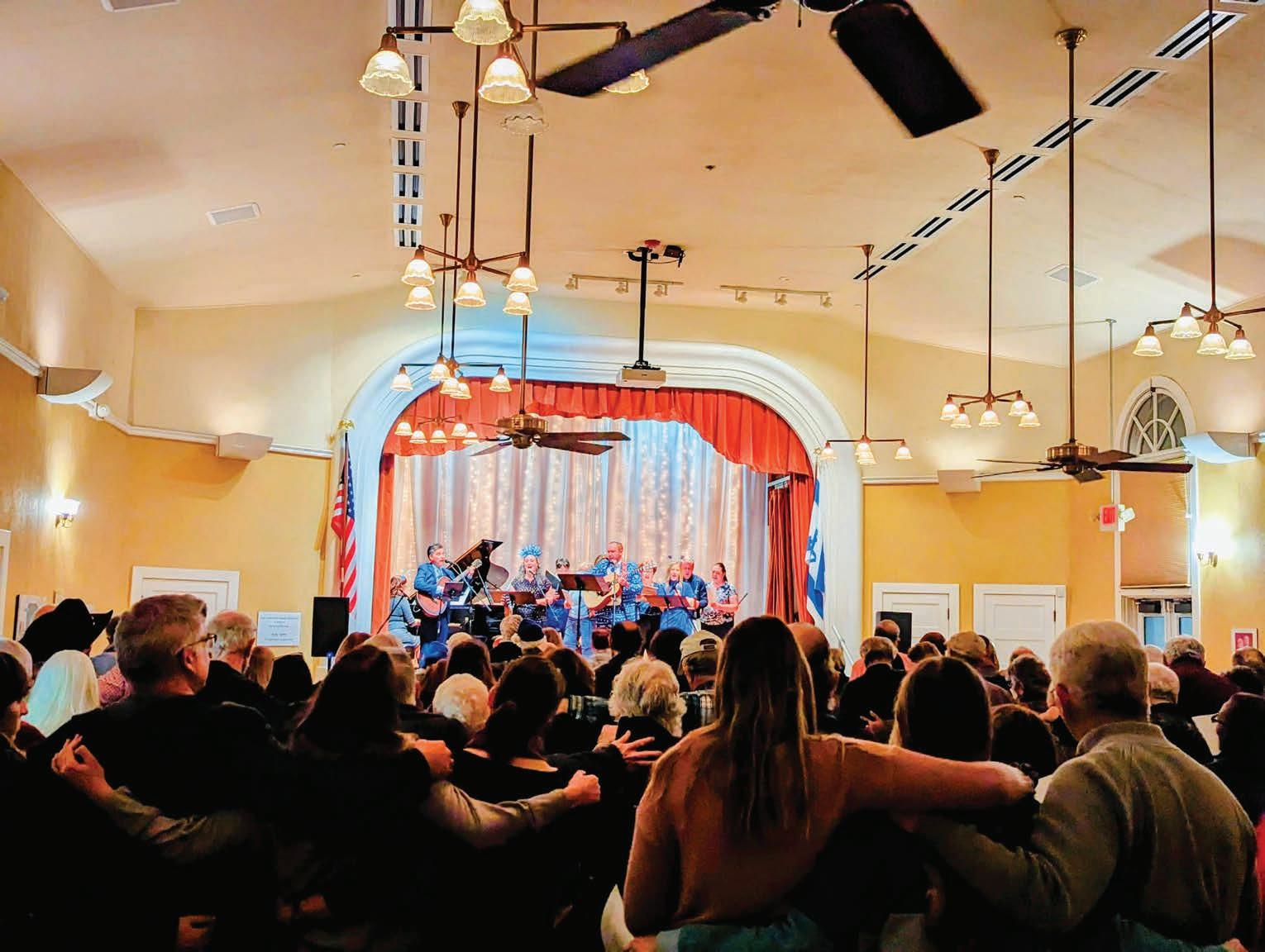 CANTOR SETH ETTINGER
CANTOR SETH ETTINGER
Isn’t music miraculous? Think about it. When you hear a song, how many of you are instantly transported back to a memory from childhood long forgotten or prompted to call a friend or family member whom you haven’t spoken to in ages? Music can make us happy when nothing else seems to be working. Music enables us to heal and gain a stronger sense of self. It is what the late Debbie Friedman refers to in her song, “Not by Might,” when she says, “the children sing; though their tears may fall you will hear them call and another song will rise.” For me, music helps me maintain patience in tackling the struggles that come with living. It should come as no surprise then that we, the Jewish people, have a long history (5783 years to be exact) of utilizing the miraculous powers of music in our Jewish tradition to keep our connection with God and maintain our spirituality along with filling our hearts with hope and courage, especially on the darkest of nights. As the psalmist wrote, “come into the service of God singing joyously.” (Psalm 100:2). Forget about latkes, dreidel and jelly donuts; in my opinion, when it comes to celebrating Chanukah and lighting up the night, nothing ignites the spark more than singing the Chanukah songbook.
OPINION Commentary JEWISHAZ.COM JEWISH NEWS JANUARY 20, 2023 13
SEE ETTINGER, PAGE 14
I THINK WE SHOULD TRY TO MAKE THE BEST POSSIBLE DECISIONS DAILY AND FORGIVE OURSELVES, STAND UP AND BRUSH OURSELVES OFF WHEN WE FALL SHORT — AND TRY AGAIN TOMORROW.
Rabbi Bonnie Koppell
COURTESY OF RABBI BONNIE KOPPELL
COURTESY OF CANTOR SETH ETTINGER
The crowd enjoys the Phoenix Sings Chanukah Sing-a-long at the Arizona Jewish Historical Society.
I am in awe of them
Yes, we have beautiful Hebrew-English Siddurim, and we announce page numbers throughout the service. Yet, I am sure it’s not so easy to sit through the entire prayer without understanding Hebrew.
s the Chabad Rabbi at ASU, my family and I are delighted to host hundreds of Jewish students weekly at our welcoming and vibrant Levenbaum Chabad House at ASU.
We love seeing the Jewish students — the ASJew’s — feel at home at Chabad and we understand why they love coming.
But there is one time of the week that I’m amazed to see students joining. I am in awe of those who come to Shabbat morning Services.
Why? You might ask.
Is it because the sermons are long and boring? Well, I try to make them short and interesting for the college students attending.
Is it because the Kiddush is not good?
On the contrary, the Kiddush is quite good and our delicious, gourmet Shabbat meals are well known in the campus community.
So why am I in awe?
Because the majority of the services are held in Hebrew, the original language of the Siddur (prayerbook).
And most of our students do not read or understand Hebrew.
KOPPELL
CONTINUED FROM PAGE 13
This is why I am in awe of them. Despite that challenge, they come, they show up and participate as much as they can.
Often, I find that some Jews who don’t read Hebrew feel like second-class citizens. They (wrongly) feel as if not being
Jewish people in the desert and translated the Torah to … 70 languages! Those 70 languages included all of the languages spoken at that point in history.
If I were to guess, I’d say that not many of those present at the desert were multilingual.
In other words, the entire Jewish people was just standing there, listening to Moses speaking in a language they didn’t understand, and then doing it again in another language, and again … for a total of 70 times!
By being the first to offer a translation, Moses was sending a clear message: even if you don’t read Hebrew, the Torah you learn is holy. It is the same Torah, whichever language you can understand.
EXACTLY 3,295 YEARS AGO, ON ROSH CHODESH, THE FIRST DAY OF THE MONTH OF SHEVAT, MOSES STOOD IN FRONT OF THE JEWISH PEOPLE IN THE DESERT AND TRANSLATED THE TORAH TO … 70 LANGUAGES!
able to pray and study Torah in its original language, means that they are somehow less of a Jew.
For those who might feel this way, here is a beautiful fact.
Exactly 3,295 years ago, on Rosh Chodesh, the first day of the month of Shevat, Moses stood in front of the
priority focus of the new year, based on the number of ads for gym memberships around this time. We all know we should exercise more, eat better and sleep more. And, I might add, be more accepting of ourselves and others and the glorious diversity of our bodies.
I promise to eat more vegetables this year, blee neder
Which leads us to the emotional level. Yes, to be more accepting of ourselves and others. More kindness and less anger. More forgiveness and less regret. More energy giving to others and causes we believe in can be a foundation for a sense of well-being in the year ahead.
Then there’s the intellectual level. Could this be the year when we read that book that’s been sitting on the nightstand? When we sign up for a class on a topic we’ve been meaning to explore? When we commit to studying the weekly Torah portion? We are, after all, the people of the book!
Remaining is the spiritual realm. Are you a person who thinks about what makes life meaningful and how you can enhance that focus in your own life? Maybe just saying Modeh Ani in the morning or Shema in the evening? Maybe saying a blessing before you eat? Maybe reminding yourself right now of your dreams and visions for yourself? Maybe committing to more gratitude and less negativity and judgment?
As we enter 2023, let’s be kind to ourselves and others and remember that we are doing the best we can. Instead of big resolutions, perhaps a humbler approach is in order. No promises, no vows, just the resolve to renew and enhance our focus on dedicating ourselves to our continued growth physically, emotionally, intellectually and spiritually. JN
Rabbi
What was the purpose of this?
The Lubavitcher Rebbe explains that Moses wanted to imbue the translations with holiness.
If he taught the Torah exclusively in Hebrew, the translations might have been considered a foreign element, something that is not holy.
ETTINGER
CONTINUED FROM PAGE 13
On Saturday, Dec. 17, 2022, 180 people (a very chai number) filled the Lewkowitz Sanctuary at the Arizona Jewish Historical Society during the second Phoenix Sings Chanukah Sing-a-long led by four Phoenix area cantors (Todd Herzog, Dannah Rubinstein, Noa Shaashua and me), a new Jewish community choir from Congregation Beth Israel and singers from the Jewish Family & Children’s Service Creative Aging program. The concert featured new Chanukah hits like “Light Up the Night” by Jewish rocker Jacob Spike Kraus and “Be A Light” by Rabbi Neal Katz. What really got the crowd singing were the “oldies but goodies” like “Not by Might” and “I am a Latke” by Debbie Friedman, “Ocho Kandelikas” by Flory Jagoda, “Light One Candle” by Peter Yarrow, the folk melodies of Mi Yimalel and S’vivon and a closing mashup of Maoz Tzur and “Loves Me Like a Rock” by Paul Simon which brought everyone to their feet.
It was the first time since prior to the pandemic where the Jewish community came together to sing and for the majority of the group that gathered, it was a much-
No doubt, learning Hebrew has its benefits. Being able to read the Torah in the language given by G-d is of great value. Still, one should never feel demoralized by their lack of Hebrew knowledge.
This coming Monday is Rosh Chodesh Shevat (this year on January 23). It was on that day, 3,295 years ago, that Moses translated the Torah.
This day will forever be remembered in history as the day when the message was loud and clear: regardless of your language, the Torah is yours, forever.
Now let’s go and explore our amazing G-dly gift of the Torah! Regardless of the language you study the Torah, the Torah is your heritage and birthright and your gift from G-d. JN
needed experience of comfort. Not only did congregants come but Jews who do not have a spiritual home came as well. The highlight for me was seeing members of the Gesher Disability Resources community stand up and dance a hora together. Aside from the financial success in that we raised several thousand dollars for camp scholarships through the Center for Jewish Philanthropy of Greater Phoenix Community Camp Fund, the level of engagement we were able to cultivate with those who came was unprecedented. I know this was a flame that will last throughout until next Chanukah. We look forward to brightening the light of Chanukah next year with all of you at our third Phoenix Sings Chanukah Sing-a-long on Dec. 2, 2023. Until then, continue being a light and may it be a happy and healthy 2023 for all. JN
Cantor Seth Ettinger is the cantor of Congregation Beth Israel in Phoenix and the creator of the Phoenix Sings Chanukah Sing-a-long.
Jewish News is published by the Jewish Community Foundation of Greater Phoenix, a component of the Center for Jewish Philanthropy of Greater Phoenix.

RELIGIOUS LIFE TORAH STUDY
Rabbi Shmuel Tiechtel is the director of Rohr Chabad at ASU.
SHABBAT CANDLE LIGHTING JANUARY 20 - 5:30 P.M. JANUARY 27 - 5:37 P.M. SHABBAT ENDS JANUARY 21 - 6:28 P.M. JANUARY 28 - 6:35 P.M.
Find area congregations at jewishaz.com, where you can also find our 2023 Community Directory.
Bonnie Koppell is the associate rabbi of Temple Chai in Phoenix.
PARSHAH VAERA EXODUS 6:2 - 9:35
14 JANUARY 20, 2023 JEWISH NEWS JEWISHAZ.COM
RABBI SHMUEL TIECHTEL
Rabbi Shmuel Tiechtel COURTESY OF RABBI SHMUEL TIECHTEL
Ambitious Scottsdale duo create niche building business


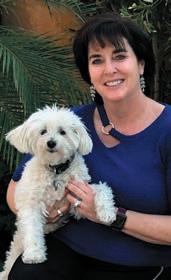 MALA BLOMQUIST | MANAGING EDITOR
MALA BLOMQUIST | MANAGING EDITOR


Jared Amzallag and Zander Diamont met in Los Angeles and moved to Arizona to work on real estate development together. When the pandemic hit, they were in the middle of a rezoning process for a 15-unit townhouse development. Realizing that their timeline for the rezoning process would be further delayed, they shifted their sights on a COVID-related need — home office space.

“The first thought was backyard offices,” said Diamont. “We had a lot of free time on our hands, and we are both ambitious, so we said let’s leverage our marketing background and design a cool little backyard office, then launch a website and see what happens.”
Amzallag grew up in Scottsdale, attended Arizona State University and owned an advertising agency. He joked that he doesn’t go to synagogue but sees his rabbi about once a week. Rabbi Pinchas Allouche from Scottsdale’s Congregation Beth Tefillah and his father are close friends.
“I go to his house for dinner during the holidays,” said Amzallag. “I love him and his family. He and my dad have become inseparable over the last few years.”

Diamont’s background is in luxury real estate sales and marketing. He belonged to Stephen Wise Temple in Los Angeles but since moving to Arizona, he said he’s had his head down working for the last year and a half and hasn’t had a chance “to dive in here” and find a synagogue to join. After they launched the Minimal Living Concepts website, the phone started ringing and hasn’t stopped.
“Suddenly, people started asking for bigger units, so we designed a full lineup and started selling units and growing from there,” said Diamont. “So, the passion side project turned into the main
one. It’s a blessing that it did.”
Minimal Living Concepts currently offers six floor plans, ranging from 429 square feet to 1,600 square feet. Amzallag and Diamont said their most popular product is Live, a one-bedroom living space designed with minimalism and utility in mind. They are currently working on new designs for 2023, including a unit that won’t have plumbing or walls; it will just be an open, finished space with electricity for use as a gym or an artist’s studio.
Diamont said that they are hired for an array of different situations. People have wanted space for an office, pool house, kids’ playroom, a child coming home from college or out-of-town guests. They have snowbirds who build on their kids’ property. The parents live out of state and spend three months in the unit.
“About 60% of the time, people are looking to build multigenerational housing on their property,” said Amzallag. “They say, ‘I’m looking to build a place for my mother or father, or both, to come live on my property with me. I want to keep them close to home and I don’t want to put them in assisted living.’”
They joked that many of their clients come to them “like a scorned lover who has been burned” by a contractor in the past through a terrible experience with a remodeling project.
“We’re trying to bring a new opportunity to the construction space and tell people you can get something that’s predesigned, prepackaged and you’ll understand exactly what it is that’s being delivered to you — within 98% accuracy of exactly what that project costs,” said Diamont.
Minimal Living Concepts handles the entirety of the project from planning
to permitting — all the way through construction. Typically, with a new build, people need to hire an architect to draw up the plans and then hire a contractor to help them through the building process, Diamont said.
“In terms of an accessible, consumerfriendly, direct-to-the-consumer system, it doesn’t really exist,” he said. “Right now, we’re bringing it to guest homes and additions and our plan is to bring that same model into full-scale home building as well.”
Amzallag and Diamont, who are both millennials, said that their age group is looking for alternative housing. They researched prefabrication, steel building methods and even shipping containers before coming back to wood as the material for their construction, stating it’s “easy to build with, flexible, everybody
knows how to use and it’s accessible everywhere.”
But nine-foot ceilings, commercialgrade, large dual-pane windows and wrapping the structure in a steel façade give the units a modern look that mimics those popular housing alternatives.
Their goal is to complete 50 projects this year and expand into 3-10 full residential dwellings. They are also working on finding contracting partners to start offering projects in the Flagstaff area and Tucson. “By the end of the year, we want to be all over Arizona,” said Diamont.


“We talk about it all the time; it doesn’t feel like work for us. We’re growing our baby and it’s been awesome watching this thing take on a life of its own.” JN For more information, visit minimallivingconcepts.com.

SPECIAL SECTION JEWISHAZ.COM JEWISH NEWS JANUARY 20, 2023 15
REAL ESTATE & HOME DESIGN Let me be your “KOSHER CONNECTION” “I’ll treat you like family, because you are!” Amy Rosenthal 602-430-3158 AmyRosenthalRealtor@gmail.com www.AmyRosenthal.com One of the top 50 Realtors in Phoenix/Scottsdale as voted by Phoenix Magazine! BUYING? SELLING? LOCAL? LONG DISTANCE? Toby Weinstein Broker Associate Full service Real Estate needs, including property management I will make your next real estate transaction pleasant, productive, and profitable. Bus (480) 948-5554 • Cell (602) 228-0265 Tobyre4u@aol.com 7077 E. Marilyn Rd., Bldg. 4, Ste 130 Scottsdale, AZ All Real Estate Agents Are Not Alike!
A completed unit ready for use.
COURTESY
OF MINIMAL LIVING CONCEPTS
Left photo: Jared Amzallag and Zander Diamont. COURTESY OF MINIMAL LIVING CONCEPTS
The pre-prequalification: Credit scores
getting prequalified, you’ll want to pay extra attention to your credit, debt to income ratio and down payment. Here, we will be focusing on credit.
housing market. With heavy influence from the COVID-19 pandemic, interest rates were at an all-time low, appreciation skyrocketed and everyone wanted a piece of the pie. The previous two years haven’t been particularly welcoming to buyers, let alone first-time home buyers just entering the housing market.
Come June 2022, all that changed. The market normalized as interest rates increased, appreciation slowed and more homes for sale entered the once limited pool of housing inventory. With the current housing market in favor of buyers, it’s imperative buyers prepare themselves and their finances to facilitate a smooth home buying process.

Before driving across the Greater Phoenix area, visiting all the magnificent homes under the warm desert sun, buyer’s need to address the not so glamorous part of the home buying process — understanding their buying power. The first step to determining one’s buying power, is speaking with a lender and unveiling their financial situation. This process is known as the pre-qualification process. To help you best prepare for
Your credit score is a number ranging from 300-850 and is used to determine your creditworthiness. Factors such as monthly payments, length of credit history, amount of credit accounts, types of credit and more are used to calculate your specific credit score. Lenders favor higher credit scores, as it indicates a level of financial responsibility. Most mortgage loans have a minimum credit score requirement. The minimum score varies depending on the type of loan. According to Rocket Mortgage, national mortgage load provider, the minimum credit score for a conventional loan is 620. Government backed loans, such as FHA, cater to individuals with lower credit scores and allow scores as low as 580.
While it’s extremely helpful to have programs that are inclusive to lower credit scores, it comes with a price — loans with lower credit requirements typically offer higher interest rates, which result in higher monthly payments. How about that for a catch-22? For this reason, professionals highly advocate working on increasing your score to give you the best possible loan option.
The first place to begin with credit improvement is knowing and understanding your credit score and credit report. Individuals can gain access to their credit information by various means, including annualcreditreport. com, their banking institution or creditkeeping apps such as Credit Karma. By viewing your specific credit report, you will see the exact factors that contribute to your score.
Although everyone has different credit improvement needs, there are several tips that can benefit all, as certain financial activities can carry more weight than others when it comes to impacting your

credit. The first is your payment history. Be sure to pay all of your payments on time and never miss a payment. Missing a payment will negatively impact your credit score, so try your hardest to avoid any late or missed payments at all costs. Auto-pay is a great tool to ensure making your payments on time!
Hack number two is keeping your credit card use under 30% utilization — 10% is even better! A simple example is if you have a credit card with a maximum limit of $1,000, you should try not to use more than $300 of that $1,000 limit within a statement period. However, the real hack is not about decreasing your spending but rather increasing your limit. Try reaching out to your banking institution and request a limit increase. With a limit increase, you can allow yourself more wiggle room with your spending and can take advantage of having a lower utilization ratio. Another vital aspect to this hack is paying off your credit card before each statement due date. This will prevent interest charges on your account and will facilitate responsible spending if you know you have to pay off the outstanding balance each month.
The next highly weighted factor is addressing any derogatory marks, such as collections or public record items like bankruptcies, civil judgements or liens. If you see any mistake on your report, you can always dispute the claim. If you happen to have any items in collection, contact the collection company and arrange a payment plan to pay off the debt. Removing any derogatory mark will greatly enhance your credit score!
Believe it or not, the age of your credit matters. If you’re young and reading this, go to your banking institution and open a free credit card. Only use it for manageable expenses, if it’s your first credit card, and pay it off every billing statement. Think of it as a designated gas
or grocery credit card and only use it for those expenses. When you’re 35, you’ll thank your younger self for opening a credit card so young! If you’re on the older side, be mindful about keeping your oldest accounts current, by making occasional purchases and limiting how often you apply for new lines of credit.
Funny enough, the lowest impact on your credit score is having your credit pulled — which tends to be the most common concern for first time home buyers. Many are hesitant the credit inquiry will severely decrease their score and put off, or avoid entirely, speaking with a lender to begin the prequalification process, thus missing out on their chance to buy a home and begin building equity — and credit! This irrational fear couldn’t be further from the truth. According to Credit Karma, hard inquiries is listed at the bottom of their low impact on credit score factors list. In fact, Jeff Richardson, vice president of marketing and communications, at VantageScore Solutions states, “after you’ve made on-time payments for a few months, the impact of that hard inquiry should go away or diminish.”
Whether you have a high credit score, or a lower one, there’s always room for improvement. By utilizing the tips above, you can enhance your score and set yourself up to obtain the best possible loan for your situation. Don’t let the fear of having your credit pulled stop you from one of the largest credit bumps you can do for yourself — acquiring a home mortgage and building equity.

SPECIAL SECTION 16 JANUARY 20, 2023 JEWISH NEWS JEWISHAZ.COM
JN
REAL ESTATE & HOME DESIGN
Ophir Gross is a realtor with Coldwell Banker Realty and has a combined skillset of business strategy and consumer psychology. She is a member of JNFuture Root Society, Women in Philanthropy, NowGen Phoenix, attends Congregation Beth Tefillah and began her roots in the community at the Phoenix Hebrew Academy and, formerly, Jess Schwartz High School. She can be reached at ophir. gross@cbrealty.com or 480-794-0807.
WIROJSID/ADOBE STOCK
Turner Classic Movies is airing a ‘Jewish Experience’ series of films this month
 LINDA BUCHWALD | JTA
LINDA BUCHWALD | JTA
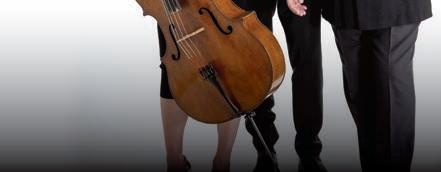
Turner Classic Movies admits that capturing the “Jewish experience” in a series of films is a daunting task, but the network is attempting to do so anyway.
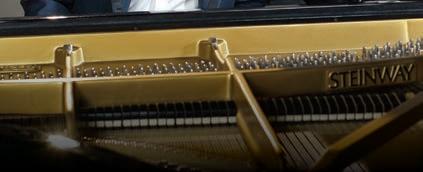
Every Thursday night in January, the channel is showing movies spanning from the 1930s through the 1990s on the theme. According to an article on the TCM website, the series aims to show “how filmmakers have attempted to deal with such themes as assimilation, antisemitism, religion, family life and the Holocaust, sometimes with clarity and honesty, other times with varying degrees of distortion and caricature.”
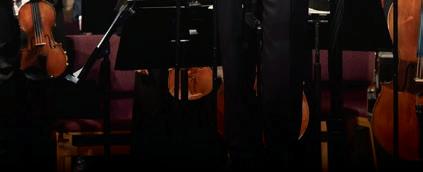
There are a couple of films in the series set during the Holocaust, but notably none involve concentration camp settings. Instead, the general focus seems to be on portraying comedy, romance and the joy of everyday Jewish life.
Antisemitism does come up often in the Jewish experience, and that is reflected in the films, including in “Crossfire,” a film noir from 1947 about the murder of a Jewish man that helped
kick off the series last week. The theme is also prominent in “Fiddler on the Roof,” which also aired on the series’ first night.

Here are the remaining movies to look forward to, in the order in which they will air in EST.
“GIRLFRIENDS” (1978), JAN. 20 AT 12 A.M.
This pioneering indie film — which according to The New York Times was the first independent American film to be funded primarily by grantmaking organizations — it also is notable for its portrayal of female friendship between Susan Weinblatt (Melanie Mayron), a Jewish photographer, and her ex-roommate Anne Munroe (Anita Skinner), who moves out to get married. Directed by Claudia Weill, who also wrote it along with Vicki Polon, the film is a precursor to so many contemporary indies, including Noah Baumbach and Greta Gerwig’s “Frances Ha.”
“THE FRISCO KID” (1979), JAN. 20 AT 1:45 A.M. Jews are not usually associated with Westerns. But in this comedy, Gene Wilder stars as a rabbi from Poland who is set to lead a congregation in San Francisco. He gets stuck en route in the Wild West and befriends a bank robber played by Harrison Ford. Some scenes don’t hold up in contemporary times, especially ones portraying Native Americans, but TCM doesn’t shy away from showing how stereotypes are part of film history.
“AU REVOIR, LES ENFANTS” (1987), JAN. 20 AT 4 A.M.
This French film is one of the few in the series that takes place during the years of the Holocaust. Louis Malle’s autobiographical film is based on his time at the Catholic school Petit-College d’Avon, at which the real headmaster Pére Jacques (Pére Jean in the film) attempted to hide Jewish children from the Nazis. The film focuses on the friendship of two fiction-
alized 12-year-old boys, Julian Quentin (Gaspard Manesse) and Jean Bonnet, whose real name is Jean Kippelstein (Raphael Fejtö).
“BILOXI BLUES” (1988), JAN. 26 AT 8 P.M.
Neil Simon adapted his own play, the second in his semi-autobiographical trilogy about growing up in Brighton Beach, for the screen. Eugene Jerome (Matthew Broderick), a young Jewish Brooklynite, is drafted into the army during World War II and is sent to bootcamp in Mississippi. The movie is helmed by prolific Jewish film and theater director Mike Nichols, who was born in Germany and immigrated to the United States as a young boy in 1939.
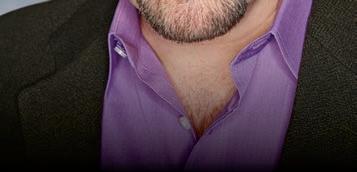

“THE CHOSEN” (1981), JAN. 26 AT 10 P.M.
Many of the movies selected for this series unsurprisingly take place in Brooklyn,
SEE TURNER CLASSIC MOVIES, PAGE 18

JEWISHAZ.COM JEWISH NEWS JANUARY 20, 2023 17
LIFESTYLE &
LOCAL Festival
ConcertsinFebruaryandMarch 3/19 Zukerman
3/5
DON’T MISS THESE EXCITING CONCERTS CONCERTS IN NORTH SCOTTSDALE FOR TICKETS: 480.422.8449 | AZMUSICFEST.ORG
CULTURE
Orchestra
Trio
Michael Feinstein & Jean Yves Thibaudet
AZMF_JewishNews_1-20_HalfPage_c4.indd 1 1/12/23 11:20 PM
1/23 Jason Alexander
Scottsdale couple launches community storytelling app
 MICHELLE TALSMA EVERSON| CONTRIBUTING WRITER
MICHELLE TALSMA EVERSON| CONTRIBUTING WRITER
According to the Arizona Office of Tourism, more than 40 million people visited Arizona in 2021 — a number that is sure to rise higher as we host the Super Bowl and other major events in 2023. While they’re here, visitors will be able to learn about our local tourist gems and hear stories about the area in a new way — through a community storytelling app called ListenUp, created by Scottsdale couple and Jewish refugees Irina and Igor Ilyinsky.

ListenUp is a tech start-up and community storytelling app that combines crowdsourcing and artificial intelligence to create hyperlocal community stories and deliver them to users via audio in up to 22 languages.
Described as an app that tells you about “where you are, wherever you are,” the product was conceived from the couple’s own frustrations while traveling in Europe with their teenage daughters. After downloading and sampling dozens of apps promising immersive tourism experiences that fell flat on that promise, they identified the need for an open platform that would intelligently offer local information in a safe, screenless and customizable way.
“It’s very easy to use,” Irina said. “Just put on air pods or headphones, tap play in the app, put the phone away in your purse or pocket and roam freely. The app will do the rest, telling you interesting, relevant stories about where you are.”
“The app was born out of a Jewish story — we were in Venice clamoring for information from several useless apps when the idea for ListenUp was conceived — and then rigorously tested in Israel where several Israeli tour guides are contributors and testers,” Igor said. “But as a community app, we encourage each community to tell their own stories.”
Igor said that since they both grew up in immigrant households struggling to assimilate, they know what it means to lack the resources to advance in society.
TURNER CLASSIC MOVIES
CONTINUED FROM PAGE 17
including this one based on Chaim Potok’s 1967 novel set towards the end of World War II. It shows the conflict between different sects of Judaism by focusing on the friendship of two Jewish teenagers — Reuven Malter (Barry Miller), who is Modern Orthodox, and Danny Saunders (Robby Benson), who is Hasidic.
Despite having similar backgrounds — Irina was born in Minsk, Belarus and raised in Chicago and he was born in Odesa, Ukraine and raised in New York City — it gave them different perspectives on the same challenges.
“Thankfully, we had separate but equally welcoming Jewish communities to help us adapt,” he said. “We were fortunate again to have the Jewish community in Arizona welcome us when we decided to move here on a whim after a five-day trip.”
Their daughters were welcomed at Pardes Jewish Day School in Scottsdale and have made lifelong friends, Igor said, and now they want to help today’s travelers appreciate new places and help relocators, immigrants and refugees learn about their new homes so they can quickly establish roots.
When it comes to building content for ListenUp, the app uses blockchain technology to reward contributors with tokens. According to the co-founders, these tokens will eventually be exchangeable for various other cryptocurrencies as well as experiences and benefits available only to the ListenUp community.
“Blockchain is a system of transferring value internationally without an intermediary,” Irina said. “We have contributors all over the world that are currently earning cryptocurrency for creating and improving stories. As some contributors are in countries with corrupt governments, they prefer this to their fiat currency.”
Cryptocurrency allows the contributors to buy necessities like bread and milk to feed their families more easily. As stories evolve and improve over time, the contributors get more engagement from ListenUp users and stand to benefit from even more earnings.
Igor added that the audio storytelling focus makes the app and community it hopes to build particularly unique. “We are the first and only social platform focused
“PORTNOY’S COMPLAINT”
(1972), JAN. 27 AT 12 A.M.
Richard Benjamin stars in this movie based on Philip Roth’s book, adapted and directed by Ernest Lehman. Though the novel — which is written as a monologue from Alexander Portnoy to his psychoanalyst — turned Roth into a celebrity author, the film adaptation was not critically or commercially successful, especially when compared to another Roth adaptation starring Benjamin: “Goodbye Columbus.”
solely on audio, which makes it safe to use when driving, biking or walking, especially when using a screen is otherwise unsafe,” he explained. “Removing the visual element allows listeners to use their imagination, stimulate brain function and learn with entertainment. In a sea of anti-social media apps that drive our society into polarized civil disobedience, we believe we are making the world a better place.”
Eventually, the Ilyinskys said they hope ListenUp can establish a global broadcasting ecosystem that is not beholden to special interests. “We’ve learned many lessons from the past century of broadcasting and hope to facilitate a much more user-centric, democratized and digitally-aware future while avoiding the centralized missteps,” Igor said.
To accomplish their goal, they note that they need community support. “We need help in achieving our mission,” Irina said. “We need funding, stories, connections, volunteers and we need people to tell their friends and family about what we are doing.”
The Ilyinskys hope the app inspires all
“THE LAST METRO” (1980), JAN. 27 AT 2 A.M.
The other Holocaust movie in the series is also from France, and is one of director French New Wave pioneer François Truffaut’s most commercially successful films. The manager of a small theater company in Paris (Catherine Deneuve) hides her Jewish husband (Gérard Depardieu) during the Nazi occupation.
generations of Jewish people to tell their stories and capture their memories before it’s too late.
“We often don’t appreciate stories until we reach a certain age or a certain event occurs, like the loss of a loved one, so we fail to ask. But if shared, stories allow one person to live through the perspective of another and develop an understanding,” said Irina. “Much of the conflict of our day is rooted in misunderstandings and fueled by industries that benefit from them. We hope the alternate perspectives provided curb antisemitism, Islamophobia and other forms of racism.” JN
For more information, visit joinlistenup.com.
Michelle Talsma Everson is a freelance writer and editor based out of Phoenix.
“TEVYA” (1939), JAN. 27 AT 4:15 A.M.
The series closes with another take on Sholem Aleichem’s stories that makes a nice bookend with “Fiddler on the Roof.” Adapted and directed by Maurice Schwartz, who also stars in the titular role, the Yiddish film was thought to be lost until a print was found in 1978. In 1991, it became the first non-English film to be selected for preservation in the library of Congress National Film Registry for its cultural significance. JN
18 JANUARY 20, 2023 JEWISH NEWS JEWISHAZ.COM LIFESTYLE & CULTURE LOCAL
Irina and Igor Ilyinsky.
COURTESY OF MATT YOUNG
COURTESY OF LISTENUP
Hiking Camelback Mountain is featured on the ListenUp app.
Chanukah party at the White House

Democratic
of America,


Baby & all of us
Young Gavin Brown, Grandma Helene Finke, Amy Brown and Grandpa David Finke, representing three generations, take a group photo at the annual Chanukah party for the Bureau of Jewish Education of Greater Phoenix’s Baby & Me Shabbat.


A group from Manor Village Desert Ridge enjoying the Smile On Seniors Grand Chanukah Party on Dec. 21, 2022.


Celebrating at The Palazzo
More than 20 residents of The Palazzo, including Elaine and Steve Shapiro who are pictured here, were serenaded with live guitar music by Erez Kessler while enjoying latkes and sufganiyot prepared by Scott’s Generations during the Chanukah party thrown by Jewish Family & Children’s Service on Dec. 30.
COMMUNITY JEWISHAZ.COM JEWISH NEWS JANUARY 20, 2023 19
COMMUNITY page features photos of community members around the Valley and the world. Submit photos and details each week to editor@jewishaz.com by 10 a.m. Monday. Where’s your Jewish News? Japan Edition
Rockower, executive director of Jewish Community Relations Council of Greater Phoenix, peruses an issue of Jewish News over a tradional meal in Japan. A grand Chanukah party
This
Paul
COURTESY OF SMILE ON SENIORS
COURTESY OF BUREAU OF JEWISH EDUCATION OF GREATER PHOENIX’S BABY & ME SHABBAT
COURTESY OF DEBRA STEIN
Pictured from left are Debra Stein, Arizona chapter lead for Jewish
Council
Dana Gordon, U.S. Rep. Adam Schiff (CA-30) and Jill Zipin at the White House Chanukah party.
COURTESY OF JEWISH FAMILY & CHILDREN’S SERVICE
Featured Event
SUNDAY, JAN. 29
Jonathan’s Walk — Family Fun Day
12:30-4 p.m. Chaparral Park, 5401 N. Hayden Road, Scottsdale. Jonathan’s Walk4Friendship is a 1-mile walk that raises funds and community awareness for The Friendship Circle, a nonprofit organization for individuals with special needs. After the walk, there is entertainment, activities, food and more. For more information, visit jonathanswalk.com.

Events
SUNDAY, JAN. 22
Jewish Speed Dating Event: 1-3:30 p.m. Kitchen 18, 10211 N. Scottsdale Road, Scottsdale. An event for adults age 50-65. Cost: $25; includes food and one non-alcoholic beverage. RSVP at jewishspeeddatingaz@gmail.com.
Meeting and Mimosas: 1 p.m. Beth El Phoenix, 1118 W. Glendale Ave., Phoenix. Join Beth El for their first “Chavurah” meeting of young adults to plan monthly get togethers and activities. Everyone between 25-35 years of age is welcome to attend. For more information or to RSVP, contact rharmon@ bethelphoenix.com.
Busy in Brooklyn: 2 p.m. Pardes Jewish Day School, 12753 N. Scottsdale Road, Scottsdale. Join the Bureau of Jewish Education of Greater Phoenix for an afternoon of cooking and learning about the history of Jewish foods in New York. Part of BJE’s Jewish Passages 2023 series. Cost: $20. For more information, visit bjephoenix. org/programs/passages.
WEDNESDAY, JAN. 25
JBox Food Pantry: 10 a.m.-12:30 p.m., East Valley Jewish Community Center, 908 N. Alma School Road, Chandler. Pick up a box of kosher groceries. Reserve a box by Jan. 22. For more information, visit evjcc.org/ foodpantry.
TUESDAY, JAN. 24
PAN’s January Gathering: 4:30-6 p.m. Ina Levine Jewish Community Campus, 12701 N. Scottsdale Road, Scottsdale. Join the Professional Advisory Network of the Center for Jewish Philanthropy of Greater Phoenix for a presentation and discussion on the ins and outs of estate administration. Open to professional advisors in the estate planning community and nonprofit partners, the goal is to create meaningful relationships that will ultimately advance the philanthropic interests of the Jewish community. For more information, contact Rachel Rabinovich at 480-481-1785 or rrabinovich@phoenixcjp. org.
THURSDAY, JAN. 26
Women’s Resilience and Survival in the Holocaust: 1-2 p.m. Virtual. Join Valley Beit Midrash for a presentation by Professor Bjorn Krondorfer, director of the MartinSpringer Institute at Northern Arizona University tracing the lives of two women Holocaust survivors who both grew up in traditional Jewish families in Bedzin, Poland and later became residents of Arizona: Jane Lipski (Tucson) and Doris Martin (Flagstaff). Cost: $18. For more information, visit valleybeitmidrash.org.
SATURDAY, JAN. 28
Mah Jongg Party — A Friendly Tournament
“Lite:” 12:30-4:30 p.m. Via Linda Senior Center, 10440 E. Via Linda, Scottsdale. Tournament with three rounds of three games each. Includes prizes, refreshments, raffles and more. Cost: $25 per person. For more information, contact 480-3125810 or anc.apm.activecommunities.com/ Scottsdale/Activities class #37749.
Be a Believer! It’s Dance Fever: 7-9 p.m. Imperial Ballroom Dance Company, 7077 E. Bell Road, Scottsdale. Join Brandeis National Committee Phoenix Chapter for an evening of dancing to tunes from the 1960s to 1980s. Cost: $40-$55. For more information, visit brandeisphoenix.org.
SUNDAY, JAN. 29
“Shma PJ” Party at The New Shul: 6-7:30 p.m. The New Shul, 7825 E. Paradise Lane. Scottsdale. Come in your pajamas for this fun family program. All families and all ages welcome. Cost: Free. For more information, contact Jolene Kuty at kutychiropractic@ yahoo.com.
How Can We Understand Contemporary Antisemitism: 7-8:30 p.m. Temple Solel, 6805 E. McDonald Drive, Paradise Valley. Join Michael Berenbaum, director of the Sigi Ziering Institute: Exploring the Ethical and Religious Implications of the Holocaust and a professor of Jewish Studies at the American Jewish University, for a presentation, followed by a Q&A with the audience. Cost: Free. For more information, contact Tara Marcussen at tmarcussen@ templesolel.org.
MONDAY, JAN. 30
Talking About the Holocaust in Today’s Political Climate? Ethical Implications: 7 p.m. Prochnow Auditorium, Northern Arizona University, 317 W. Dupont Ave., Flagstaff. Join Michael Berenbaum for a presentation and Q&A. For more information, contact Melissa Cohen at melissa.cohen.edu.
SUNDAY, FEB. 5
CAREaVAN Zoom Info Session: 4:30-5:15 p.m. Virtual. Teens entering grades 9-12 in 2023 can join the Bureau of Jewish Education of Greater Phoenix’s Hebrew High and learn about its CAREaVAN teen volunteer road trip. They are traveling to San Francisco this summer, June 11-21. For more information, visit bjephoenix. org/2023-summer-careavan.
SUNDAYS
B.A.G.E.L.S: 9-11 a.m; last Sunday of the month. Valley of the Sun Jewish Community Center, 12701 N. Scottsdale Road, Scottsdale. Grab a bagel and a cup of coffee at Bagels And Gabbing Every Last Sunday and enjoy
some time with your friends and make new ones. You must register to attend. Bagels and coffee will be provided. Cost: Free for members, $5 for guests. For more information and to register, visit vosjcc.org.
MONDAYS Mahjong: 10 a.m.-12:30 p.m. East Valley Jewish Community Center, 908 N. Alma School Road, Chandler. Come play Mahjong each week. For experienced players only. Free; registration required at evjcc.org/ mahjong.
THURSDAYS
Storytime at Modern Milk: 9:30 a.m. Modern Milk, 13802 N. Scottsdale Road, #163, Scottsdale. Storytime for babies, toddlers and preschoolers. Integrates children’s books and songs while giving parents new ideas for play. Cost: $5. For more information and to register, visit modernmilk.com/after-baby.
Meetings, Lectures & Classes
SUNDAYS
Chassidus Class: 9 a.m. Online. Learn about the Chasidic movement with Rabbi Yossi Friedman. Cost: Free. For more information, visit chabadaz.com.
Jewish War Veterans Post 210: 10 a.m. Online. Any active duty service member or veteran is welcome to join monthly meetings, every third Sunday. Cost: Free. For more information, email Michael Chambers at c365michael@yahoo.com.
Anxiety in the Modern World: 6 p.m. Online. Learn the secrets of the Torah for living stress-free in the current environment with Rabbi Boruch of Chabad of Oro Valley. Cost: Free. Tune in using this link: zoom. us/j/736434666. For more information, visit chabadaz.com.
MONDAYS
Ethics of Our Fathers: 7 p.m. Online. Learn with Rabbi Zalman Levertov. Tune in at: bit.ly/2Y0wdgv. Cost: Free. For more information, visit chabadaz.com.
Quotable Quotes by our Sages: 7 p.m. Online. Learn with Rabbi Shlomy Levertov. Tune in at: JewishParadiseValley.com/ class. Cost: Free. For more information, visit chabadaz.com.
Learning to Trust in God: 7:30 p.m. Online. Learn with Rabbi Yossi Friedman. Tune in at: ChabadAZ.com/LiveClass. Cost: Free. For more information, visit chabadaz.com.
Torah & Tea: 7:30 p.m. Online. Learn with Rabbi Yossie Shemtov. Cost: Free. For
more information, visit Facebook.com/ ChabadTucson.
TUESDAYS
Gratitude: 10-11 a.m. Temple Beth Shalom of the West Valley, 12202 N. 101st Ave., Sun City. Four-week class about gratitude led by Rabbi Dana Evan Kaplan and Reva Litt, a Temple Beth Shalom member, Feb. 7-28. Cost: $18 for members and $36 for non members; advance registration and payment required by Feb. 2. For more information, contact 623-977-3240 or templebethshalomaz@gmail.com.
Tuesdays at the J: 10-11:30 a.m. East Valley Jewish Community Center, 908 N. Alma School Road, Chandler. Join individuals and couples age 55 plus for presentations on a variety of topics. Cost: Free; registration required. For more information, visit evjcc. org/tuesdays.
Let’s Knit: 1:30 p.m. Ina Levine Jewish Community Campus, 12701 N. Scottsdale Road, Scottsdale. Share the pleasure of knitting, crocheting, etc. outside the social hall in the campus. Can’t knit? We can teach you! Every level welcome. Cost: Free. For more information, visit vosjcc.org. Maintaining an Upbeat Attitude: 7 p.m. Online. A class exclusively for people in their 20s and 30s, learn how Jewish Mysticism can help with your attitude with Rabbi Shlomy Levertov. Cost: Free. Tune in at: JewishParadiseValley.com/YJPclass. For more information, visit chabadaz.com.
WEDNESDAYS
History of the Jews: 11:00 a.m. Online. Learn the Jewish journey from Genesis to Moshiach with Rabbi Ephraim Zimmerman. Cost: Free. Tune in here: zoom. us/j/736434666. For more information, visit chabadaz.com.
Torah Study with Temple Beth Shalom of the West Valley: 11 a.m.-12:30 p.m. Online. Weekly study group explores that week’s portion and studies different perspectives and debates the merits of various arguments. Intended for adults, Torah study is open to students of all levels. For more information, contact the TBS office at 623-977-3240.
Happiness Hour: 11:30 a.m. Online. Class taught by Rabbi Pinchas Allouche that delves into texts and references culled from our traditions to address a relevant topic. For more information or to join, visit cbtvirtualworld.com.
Torah Study with Chabad: 12 p.m. Online. Take a weekly journey of Torah with Rabbi Yossi Levertov. Cost: Free. For more information, visit chabadaz.com.
CALENDAR 20 JANUARY 20, 2023 JEWISH NEWS JEWISHAZ.COM
COURTESY OF FRIENDSHIP CIRCLE
Lunch & Learn: 12:15 p.m. Online. Grab some food and learn with Rabbi Yehuda Ceitlin. Cost: Free. Get Zoom link by emailing info@ chabadtucson.com. For more information, visit chabadtucson.com.

The Thirteen Petalled Rose: 1 p.m. Online. Kabbalah class that studies “The Thirteen Petalled Rose” by Rabbi Adin Even-Israel Steinsaltz, focusing on the many concepts of Kaballah and Jewish Mysticism and applying them to everyday life. For more information or to join, visit cbtvirtualworld.com.
JACS: 7:30-8:30 p.m. Valley of the Sun Jewish Community Center, 12701 N. Scottsdale Road, Scottsdale. In person and via Zoom support group for Jewish alcoholics, addicts and their friends and family on the first and third Wednesdays of the month. Cost: Free. For more information, email jacsarizona@gmail.com or call 602-692-1004.
THURSDAYS
America’s Four Gods: 10-11 a.m. Temple Beth Shalom of the West Valley, 12202 N. 101st Ave., Sun City. Interactive four-week program led by Rabbi Dana Evan Kaplan and Temple President Fay Henning-Bryant, Feb. 2-23. Based on the book, “America’s Four Gods: What We Say About God — And What That Says About Us,” written by Paul Froese and Christopher Bader. Cost: $18 for members and $36 for non members; advance registration and payment required by Jan 30. For more information, contact 623-977-3240 or templebethshalomaz@ gmail.com.
Ladies Torah & Tea: 10:30 a.m. Online. Learn about the women of the Torah with Mrs. Leah Levertov. Cost: Free. Tune in at: ourjewishcenter.com/virtual. For more information, visit chabadaz.com.
The Science of Everything: 4 p.m. Online. Explore the most fundamental work of Chassidut: the Tanya, with Rabbi Boruch. Cost: Free. Tune in at: zoom. us/j/736434666. For more information, visit chabadaz.com.
Teen Discussions: 7-8:30 p.m. Online. Learn with Rabbi Tzvi Rimler. Cost: Free. Tune in at cteen.clickmeeting.com/east-valley. For more information, visit chabadaz.com.
SATURDAYS
Saturday Mindfulness Gatherings: 9:30 a.m. Online. Hosted by Hospice of the Valley. To join by phone, dial 1-253-215-8782, meeting ID 486 920 2119#. To get the Zoom link or for more information, contact Gill Hamilton at ghamilton@hov.org or 602-748-3692.
Book Discussion: 1:30-2:30 p.m. Online. Join Or Adam Congregation for Humanistic Judaism on the third Saturday of every month for a book discussion. For more information and to register, contact oradaminfo@gmail.com.
Shabbat
FRIDAYS
Shabbat in the Park: 10-11 a.m. Cactus Park, 7202 E. Cactus Road, Scottsdale. Join the Bureau of Jewish Education of Greater Phoenix monthly for music, parachute play, crafts and a family Shabbat experience. For more information, visit bjephoenix.org.

Welcome Shabbat: 11-11:30 a.m. Online.
Celebrate Shabbat with the JFCS Virtual
Center for Senior Enrichment. Each week a different guest host will lead the program with song and celebration. Cost: Free. For more information, visit jfcsaz.org/cse.
Shabbat at Beth El: 11-11:45 a.m. Beth El Phoenix, 1118 W. Glendale. Ave., Phoenix.
Celebrate Shabbat with songs, blessings and teachings with Rabbi Stein Kokin the first Friday of every month. Special guests will be welcoming Shabbat during the remainder of the month. For more information or to join, visit bethelphoenix.com.
Erev Shabbat Service: 5:30 p.m. Online. Rabbi Alicia Magal will lead a service livestreamed for members of the Jewish Community of Sedona and the Verde Valley. Cost: Free. For more information and to obtain the Zoom link, visit jcsvv.org/contact.

Shabbat Services: 5:30 p.m. nosh, 6:15 p.m. service; morning varying dates and times. Temple Chai, 4645 E. Marilyn Raod, Phoenix. For more information, contact Sheana Abrams at (602) 971-1234 or sabrams@ templechai.com.
Pre-Shabbat Kiddush Club: 6 p.m. Online. Say Kiddush with Rabbi Mendy Levertov. Cost: Free. Tune in here: ourjewishcenter. com/virtual. For more information, visit chabadaz.com.
Shabbat Services: 6 p.m; 9:30 a.m. Congregation Or Tzion, 16415 N. 90th St., Scottsdale. Services are also live streamed at otaz.org/livestream. For more information about services, events and membership, visit congregationortzion.org or call 480-342-8858.
Shabbat Services: 6:15 p.m; 10 a.m. Congregation Beth Israel, 10460 N. 56th St., Scottsdale. Services held in the Goldsmith Sanctuary. Participants must pre-register by Thursday at 5 p.m. Priority will be given to members first and then guests. If there are more requests than available seats a lottery system will be used. For more information or to make a reservation, visit cbiaz.org/ shabbat-services.
Kabbalat Shabbat and/or Shabbat morning service: 6:30 p.m.; 10 a.m.; dates vary. Congregation Kehillah, 5858 E. Dynamite Blvd., Cave Creek. Join Rabbi Bonnie Sharfman and cantorial soloists Erica Erman and Scott Leader either in person or via Zoom. For safety reasons, please register ahead of time. For dates, visit congregationkehillah.org/event/. Register by emailing info@congregationkehillah.org.
Third Friday Shabbat: 7-9 p.m. Group meets at a North Scottsdale location. The Desert Foothills Jewish Community Association hosts a Shabbat service followed by a program. Contact Andrea at 480-664-8847 for more information.
Shabbat Services with Sun Lakes: 7 p.m. Sun Lakes Chapel, 9240 E. Sun Lakes Blvd. North, Sun Lakes. Sun Lakes Jewish Congregation conducts services on the second Friday of the month. For more information, contact 480-612-4413.
Shabbat Services with Beth Ami Temple: 7:30 p.m. Gloria Christi Church, 3535 E. Lincoln Dr., Paradise Valley. Rabbi Alison Lawton and Cantorial Soloist Michael Robbins lead Shabbat services twice a month. Beth Ami welcomes people who are not affiliated and looking for a spiritual connection. For more information, visit bethamitemple.org. JN
Upcoming Special Sections
Senior Lifestyle
February
February
JEWISHAZ.COM JEWISH NEWS JANUARY 20, 2023 21
CALENDAR Camp & School Guide
17 Showcase your educational and camp offerings to Jewish families looking for the perfect fit for their children during these difficult times. JEWISHAZ.COM REACH HIGHLY EDUCATED, AFFLUENT READERS IN THE VALLEY
Contact your sales consultant to schedule your advertising at jlipson@jewishaz.com
3
home health aides to financial planners, independent living facilities to nursing homes, this is the perfect venue to showcase how your business can help older Jewish residents navigate retirement. Print | Digital | Target over 42,500 Jewish readers with a mix of print and digital. Ask e Expert February 17 Show readers you are the expert in your field by offering great advice to Jewish News readers in your field of expertise.
From
OBITUARIES

SETH JOEL FANN
Seth Joel Fann of Phoenix died Jan. 8, 2023. He was affiliated with the Mental Health Association and the Ostomy Club.
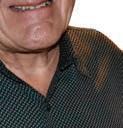
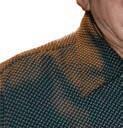
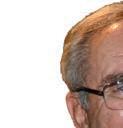
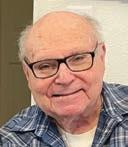
Seth was preceded in death by his parents, David (Don) Fann and Rochelle (Ricki) Fann.


He is survived by sisters Elyse Fann Webber of Phoenix/Munds Park and Caren Fann of Paradise Valley.
Arrangements made by Sinai Mortuary of Arizona. JN
Former Jerome Mayor, Lewis J. (Lew) Currier, died Dec. 25, 2022, at Verde Valley Medical Center in Cottonwood. He was 86. He is survived by his wife of 57 years, Mimi (Mary Gianasi), son Christopher (Renee Decker) and grandson Jake Currier.

Born in Cleveland, he served in the Army from 1958 to 1961, the last year in Germany, returning to Cleveland where he met and married Mimi. Lew moved with his wife and son to Jerome 52 years ago from San Francisco, California.
Lew served his adopted town as mayor for two terms, on town council for at least six years and as town clerk from 1981-1983.
His involvement with Jerome was not limited to politics. He and Mimi established the Verde Valley Transit Authority (VVTA), providing bus service in the early 1980s between Jerome, Cottonwood and Clarkdale. Until recently Lew, a bookkeeper, was treasurer of the Jerome Humane Society which Mimi helped found.
Lew was a gifted chef who apprenticed with John Dempsey at the House of Joy. He catered for such groups as the Sedona Elks. He and Mimi owned Reynard, a cybercafé in Jerome. After the restaurant closed, Lew continued bookkeeping and catering, amazing friends and family with his culinary prowess.
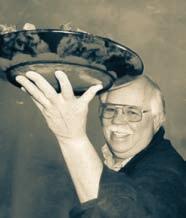
No services were held.
Contributions in Lew’s memory may be made to the Jerome Humane Society, P.O. Box 807, Jerome, AZ 86331 or any socially conscious organization.
Esther Rosen (nee Machtey) of Scottsdale passed away on Jan. 8, 2023. She was 98.
She was born in Stolpce, Poland. Esther and her family survived the Holocaust by escaping via train and foot to Siberia. After the war, she married Sam Rosen and moved to Lorain, Ohio in 1950. Her two older brothers and parents moved to Israel.
Esther has always been involved at the synagogue in Lorain and very active in sisterhood and Hadassah. Esther and Sam moved to Scottsdale in 1983, where they continued to be very involved in synagogue life and the Jewish community.
She is preceded in death by her husband, Sam (in 2010) and her oldest brother, Israel Machtey (in 2021). Esther is survived by her older brother, Aaron (Nushkah) Machtey of Petach Tikva, Israel; her three children Lynn Rosen of Austin, Texas, Elliot (Tammy) Rosen of Scottsdale and Vic (Cori) Rosen of Paradise Valley. She is also survived by seven grandchildren Chad (Sarah) Rosen, Ryan (Lindsay) Rosen, Brooke (Matt) Sommers, Jennifer (Albert) Kasperkowiak, Alanna (Jacob) Petersen, Cody Rosen and Roman (Brenna) Wommack. She was also blessed to experience the joy of 13 great-grandchildren.
Contributions in her memory can be made to Jewish National Fund 480-4478100, Hospice of the Valley 602-530-6900 or Jewish Free Loan 602-230-7983.
Sydney Sandys
Sydney Sandys passed away at his home in Scottsdale on Dec. 31, 2022. He was 91.
Sydney was born in Montreal, Quebec to Samuel and Zipporah Sandys on June 4, 1931.
Syd was an athlete and an especially avid golfer. He was a truly self-made man, becoming a builder and real estate developer. Syd moved his family to Arizona in 1979 and was dedicated to helping Phoenix and its Jewish community thrive over the last 40-plus years. Syd loved family and enjoyed nothing more than spending time with his children, grandchildren, nieces, nephews and extremely dear friends.
Lawrence Hall passed away on Dec. 3, 2022, at home in Sun Lakes. He was 88 years old.
Larry was born in New York to Michael and Lee Hall. He was an Air Force Veteran serving in Korea. He met the love of his life, Evelyn Block, on a blind date and knew instantly she was the one. He proposed on their second date and they were married for 66 years. In 1974, tired of the harsh winters and without having even visited the state, he and Evelyn took a leap of faith and moved with their three children to Phoenix. It turned out to be a great move and his parents followed shortly after.
Larry worked in the grocery store business for many years but always wanted to own his own business. In 1980, he founded Shirts ‘n’ Things, a retail store in north Phoenix selling rock and roll T-shirts and posters. The store became a big part of his life and he loved interacting with his customers. In 1989, he helped his daughter, Debbie, and son-in-law, Larry, open a Mesa location w ic continues to flouris to t is da .
Larry was extremely devoted to his family. He was especially close to his six grandkids. He and Evelyn had a beautiful tradition for each when they turned 13 that they would take the kids on a special trip to a destination of their choosing. These trips included visits to Florida, Seattle and Victoria, New York City, Cooperstown and the Poconos, Hawaii and Washington DC. He is survived by his loving wife Evelyn; sister, Barbara Lymon; son, David Hall (Jackie); daughters Meryl Nyysti and Debbie Teiman (Larry); grandchildren Chris, Sean, Justin, Paige, Jessica and Jeffrey; and great-grandchildren Devin, Hailey, Chris Jr, Kendal, Eliana and Max. He is preceded in death by his sister, Sandy Schwartz.
A graveside service was held at Beth El Cemetery on Monday December 5, 2022, wit arran ements made b Sinai ortuar and of ciated b abbi rwin iener.
Syd was an incredible storyteller and orator. His ability to extemporaneously give a speech was second to none. He possessed so many gifts; his humor, ability to care, intellect and passion enabled him to touch so many.
Syd is survived by children Cliff (Susan), Risa (Jonathon), Marla (Mark), David (Amy); grandchildren Jamie (Lindsey), Micah, Danielle, Justin, Noah and Gabriel; sisters-in-law Cookie, Esther, Sharon and Molly; and 17 nieces and nephews. He was preceded in death by his wife of 62 years, Faye; his parents and sister Beatrice. He will always be loved, never forgotten and dearly missed. Donations, in lieu of flowers, can be made to JFCS tribute cards.
SHARE YOUR ENGAGEMENT, WEDDING, BIRTH, BAR/BAT-MITZVAH ANNOUNCEMENT AND ANY OTHER SIMCHA ON BOTH JEWISHAZ.COM AND THE WEEKLY JEWISH NEWS ... FOR FREE
JEWISHAZ.COM
22 JANUARY 20, 2023 JEWISH NEWS JEWISHAZ.COM
Jerome H. “Jerry” Black died peacefully on Dec. 22, 2022, in Baton Rouge, Louisiana. He was born on Thanksgiving Day, 1921 to Hyman and Sarah Black and recently celebrated his 101st birthday surrounded by family, friends and newly born great-granddaughter, Alanis.


Jerry was raised in Bridgeport, Connecticut along with his older sister. A high school teammate at Central High suggested to him that he might enjoy the warmer climate at Louisiana State University in Baton Rouge. Jerry would later say that attending LSU was the best decision he ever made, as there he met Laulette Jean (Lauli) Marcus, the love of his life. They were married in her hometown of Alexandria, Louisiana and remained together for 63 years until her death in 2006. While attending LSU, Jerry was active in various campus organizations and was master of AEPi fraternity where he made a number of life-long friends.
After graduating LSU with a degree in Commerce, Jerry was commissioned into the U.S. Army as a Second Lieutenant at Ft. Sill, Oklahoma in the Field Artillery OCS Class #64. During WWII he spent three years at Allied Force Headquarters in Caserta, Italy where, among his other duties, he was in charge of USO performers such as Frank Sinatra and Bob Hope when they traveled overseas to entertain the troops.
In 1946, Jerry returned to the United States with the rank of Captain. He and Lauli moved to Connecticut to start their family while he went to work in his father’s dress factory. Jerry met many interesting people in the New York Garment District, but decided his interests lay elsewhere.
He went into the insurance business and soon opened his own agency. While in Bridgeport, he and Lauli were active in Park Avenue Temple and he achieved the 32nd degree Mason designation while serving as master of his Masonic Lodge.
In 1961, Jerry, Lauli and their three children moved to Phoenix where he became state manager for Guaranty Income Life Insurance Company. He earned his CLU (Chartered Life Underwriter) designation, was a member of the Million Dollar Round Table and remained in the insurance industry until his retirement in 1985.
Jerry was an active member of Temple Beth Israel and North Central Optimist Club as well as other city organizations. He became a Shriner and member of the El Zaribah Shrine where he enjoyed working with children in need. When he retired, he and Lauli moved to Sun City West, where they became active in Temple Beth Shalom and he served as temple president. His greatest pleasure, however, was traveling the world with Lauli. He was an a id olfer and s erman, s orts e en o ed wit is sons.
After Lauli’s death, and having spent almost 48 years in Phoenix, Jerry moved to Baton Rouge to be closer to family. Many afternoons and nights were spent with his sons and grandsons cheering on LSU football and baseball teams, watching golf tournaments, enjoying a good cigar and single malt scotch. He participated in those special moments up until the end. While residing at St. James Place in Baton Rouge he stayed busy with his twice-weekly poker games, swapping war stories with other veterans and never missing his 4 p.m. cocktail hour with his many friends and even some former teachers of his from LSU. He was active in a “dinner group”— old friends who went out on Saturday nights — and enjoyed speaking to various local schools to help educate students on WWII. He was a favorite of some of the local newscasters who covered those events.
Jerry was preceded in death by his wife Lauli, his parents, and his sister, Pearl Karmasin, who lived almost as long as him.
He is survived by his loving family: daughter, Carol Black Salzman (Harry) of Colorado Springs, Colorado; sons Douglas A. Black (Janet) of Baton Rouge, Louisiana and Jon M. Black (Jerie) of Shreveport, Louisiana, muchloved grandsons Joshua A. Black (Bettina) and Alex K. Black of Baton Rouge, Martin M. Black of New York City and Palmer G. Black of Phoenix; and his very special great-granddaughter, Alanis S. Black of Baton Rouge. He is also survived by a number of nieces, nephews and cousins.
A private burial was held in Sun City, where he was laid to rest next to Lauli. It was followed by a multi-day family celebration of his long life.
If desired, donations can be made to The National WWII Museum, 945 Magazine Street, New Orleans, LA 70130 or to an organization of your choosing.
Sam “Shalom” Mason, DPM died on Nov. 26, 2022. He was 98.
Sam was t e rst born son to immi rant arents, ouis and Sara os o it , of lmira, ew or on o . , . e li ed in t e tin town of Canton, enns l ania, until is famil mo ed bac to lmira in . Sam raduated wit onors from Sout side i Sc ool in .
Sam won a ew or e ents sc olars i and attended S racuse ni ersit for one ear until e was drafted into t e .S. rm . ile stationed at Cam Crowder, issouri, e came u on a traf c accident and rescued se eral eo le from a burnin bus. e rm awarded im a distin uis ed ser ice medal.
fter bein disc ar ed from t e rm , e returned to S racuse ni ersit to earn is rere uisites for odiatr sc ool. e also be an is lifelon lo e affair wit arbara erl. e married June and mo ed to ew or Cit w ere e obtained is odiatr de ree.
ile in odiatr sc ool, Sam s oldest son Jeff was born. e raduated and mo ed to ndicott, ew or in w ere e o ened a odiatr ractice, and w ere second son ar was born in . ecause t e bo s were fre uentl ill wit res irator infections, Sam and arbara decided to relocate to a warmer climate. ri ona was one of t e few states t at offered reci rocit for t e national odiatr oard am, and of t e odiatrists in ri ona onl two ad actuall one to a odiatr colle e. e recei ed ri ona odiatr icense . Sam, arbara and t e bo s settled in oeni . Sam establis ed is ractice at First and onroe in downtown oeni . Dau ter onda oined t e famil in . s oeni rew, so did Sam s ractice and e mo ed nort to t e new ar Central area. e also became an e aminer for t e State oard of odiatr . e led t e wa for odiatrists to ain os ital ri ile e and was one of t e rst odiatrists in ri ona erform sur er in a os ital. e in ited two odiatrists to artner wit im, ill Friedman and aul S a iro.
en t ou bus wit is ractice, e became a o Scout troo leader w en is sons were in scoutin , and e la ed tennis t ree times a wee . e was on t e board of n town, an ri ona interfait and interracial out ro ram. e was t e resident of t e oeni Jewis Communit Center board, s ear eaded t e de elo ment of t e JCC tennis ro ram and was on t e board of t e Jewis Federation of reater oeni . Sam and arbara were members of em le et srael for ears and were acti e c a ura artici ants.
Sam retired from ri ate ractice in and acce ted a osition as c ief of t e odiatr section at t e Carl . a den eterans dministration edical Center in oeni . is efforts wit t e transformed t e odiatr section from a one room treatment center to one of t e medical center s busiest clinics, treatin more t an , atients er ear. e odiatric residence ro ram ac ie ed S candidac status and attracted students from all se en sc ools of odiatric medicine. e was ast resident of t e odiatr association and t e ri ona State oard of odiatr aminers.
o et er wit sur ical collea ues from t e oeni , e establis ed an inno ati e ro ram, eration Desert Foot a multis ecialt a roac to diabetic foot disease w ic succeeded in dramaticall reducin t e incidence of lower e tremit am utations.
fter retirin from t e , Sam and arbara mo ed to a una oods, California, in , to be closer to is c ildren and randc ildren. e remained acti e, la in tennis until a e and la in brid e until t e mont e assed awa . n , t e mo ed to esle alms in San Die o. en carin for is wife s dementia became o erw elmin , Sam and arbara mo ed to an assisted li in facilit in a esa. arbara assed awa in . Sam remained at ontera, acti el artici atin and la in brid e once a wee until is ealt deteriorated from an a ressi e lioma in . Sam assed awa eacefull wit dau ter, onda, and is de oted care i er, ul i, at is bedside.
JEWISHAZ.COM JEWISH NEWS JANUARY 20, 2023 23
Samuel Mason, DPM






24 JANUARY 20, 2023 JEWISH NEWS JEWISHAZ.COM From your favorite restaurant to the best bagel… Day camp to your favorite doctor… Shabbat service to best nonprofit organization... The winners are chosen by popular vote, so let your friends know it’s time to cast their ballot. As a business, share with your audience to help you win the title of “Best” in your category! SUBMIT YOUR READERS’ FORNOMINATIONSCHOICE THE BEST OF JEWISH PHOENIX! Nominations close February 27 Go online and tell us what you think! jewishaz.com/readerschoice Print | Digital |



































 SHANNON LEVITT | STAFF WRITER
SHANNON LEVITT | STAFF WRITER










 CANTOR SETH ETTINGER
CANTOR SETH ETTINGER



 MALA BLOMQUIST | MANAGING EDITOR
MALA BLOMQUIST | MANAGING EDITOR










 LINDA BUCHWALD | JTA
LINDA BUCHWALD | JTA







 MICHELLE TALSMA EVERSON| CONTRIBUTING WRITER
MICHELLE TALSMA EVERSON| CONTRIBUTING WRITER




























